#then remember translations exist and vary
Explore tagged Tumblr posts
Text
Gained in Translation
I speak four languages (at varying degrees of fluency) and do translation both for smooth and peaceable family reunions and for fun, with works of literature I enjoy. It's practically a truism at this point that meaning gets lost in translation; in fact, I'm currently reading an excellent book, Babel by R.F. Kuang, in which there is magic powered by the meaning lost in translation. But a topic I hardly ever hear anyone discuss is how meaning can be gained in translation.
Example 1: References
A type of meaning that can be gained in translation is that when you translate from language A to B, you can make references to other texts in language B that the person who wrote the original in language A wouldn't have been aware of. Here is an example from a translation I did of a Pablo Neruda poem:
Yo te recordaba con el alma apretada
de esa tristeza que tú me conoces.
I remembered you with my soul gripped
by the tragic ordeal of being known by you.
These lines in Spanish reminded me a lot of the meme based on the viral New York Times article about how you need to submit to the mortifying ordeal of being known in order to reap the rewards of being loved. So I decided to make a subtle reference to that quote in the way I phrased the English translation. This meaning, of course, doesn't exist in the original Spanish; I added it in.
Example 2: Meaningful Distinctions
Meaning is often gained in translation because the target language makes a distinction that the source language does not. The translator has to choose one side of that distinction, and so meaning is gained.
Here is an example from the Spanish localization of the Japanese RPG Fire Emblem: Three Houses. There are two unlockable scenes in which the character Hubert is given a gift as a romantic gesture. Now, I don't speak Japanese, but through reading the analyses and translations done by Japanese speakers, and by checking for consistency in the kanji, I can see that the same word for "gift" seems to be used throughout these scenes. However, in Spanish, there are multiple words for "gift" with rather different connotations, which becomes relevant in the localization.
In Spanish, there is no generic word for "gift" that applies in every situation. There is a distinction made between gifts that are personal, between people who care about each other, and gifts between people who are not close, such as charitable gifts and formal gifts given to a diplomat. The translators of the game had to choose which of these words to use in the Spanish, and they used the distinction to add some very interesting meaning to these romantic scenes.
In each scene, what happens is that Hubert notices the person has a gift and comments on it, thinking it's for somebody else. In these lines, in Spanish, Hubert uses the personal intimate word for gift. Then, when he finds out the gift is for him, and reacts very awkwardly, he switches to a formal word for gift, creating an emotional distance between himself and the romantic token. This is excellent characterization and adds a layer of meaning in translation.
Example 3: Meaningful Ambiguity
Sometimes, the opposite phenomenon occurs, where the target language does not make a distinction that the source language does, and that ambiguity or vagueness adds something to the translation.
I have a Finnish friend who has told me that fiction that plays with gender is often more meaningful for him in Finnish translation than in the source language, because Finnish does not have gendered third person pronouns. Where books like The Left Hand of Darkness or Ancillary Justice have to make a conscious decision about which gendered pronoun to use for characters that fall outside the Western gender binary (The Left Hand of Darkness uses "he" and Ancillary Justice uses "she"), the Finnish translations can just use the default neutral pronoun they use for everyone, and never have to resolve that ambiguity in any direction. My friend has told me that there are some books about non-gender-normative characters that he wishes he'd read in Finnish instead of English because the experience would have felt more authentic in some ways.
What It Means
The reason why I bring all of this up is that the concept of meaning lost in translation is tied to the idea of translation as an act of violence. Indeed, there is a saying in Italian, "Traduttore, traditore," which means "Translator, traitor." I agree that translation can definitely be an act of violence that destroys the intended meaning of a text and warps it to suit the needs of the speakers of the target language. But when we focus only on what is lost in translation, at the expense of what is gained in translation, then we deny that translation can be an act of liberation and power.
I was raised in a bicultural household speaking both English and Spanish, and when I translate between these languages, it makes me feel empowered and proud of my heritage. It feels insulting to me to claim that when I translate, I can only ever deplete the meaning. That is not true. Every translation requires a translator, and we are more than thieves and traitors. We are more, even, than archivists, trying to minimize loss and decay as much as possible. We are creatives and inventors who can add something beautiful and meaningful to the text via our translations.
3K notes
·
View notes
Text
About the ~ている form
If you’re familiar with Japanese, you may have noticed some expressions like “分かっている” (wakatte iru) and “知っている” (shitte iru), which roughly translate into English as “I understand” and “I know”, but literally mean “I’m understanding” and “I’m knowing” – which would sound very strange in English.
In Japanese, several verbs use the continuous form ~ている to express states or conditions, whereas in English, we use the simple present tense. Other examples include:
English: I have money.
Japanese: お金を持っている (okane o motte iru, literally “I’m having money”).
English: I live in Tokyo.
Japanese: 東京に住んでいる (Tokyo ni sunde iru, literally “I’m living in Tokyo”).
This happens because, in Japanese, states and conditions are often viewed as ongoing processes. The ~ている form conveys a sense of continuity or ongoing existence. For example, when someone says 知っている (shitte iru), it reflects that the state of knowing persists over time. Similarly, 持っている (motte iru) indicates that the state of possession of something is ongoing. In contrast, English typically uses the simple present tense to describe states and conditions because it views them as static or general truths. For example, "I know" or "I have got" are seen as stable states rather than ongoing processes.
Furthermore, Japanese places more emphasis on the duration or the current state of an action. The ~ている form explicitly marks this, making it clear that the state is not a one-time event but something that persists over time. On the other hand, English often uses separate words or relies on context to convey aspectual differences.
To make this clearer, consider these examples:
知る (shiru) means "to come to know" (a moment of realization).
知っている (shitte iru) means "to know" (continuously being in the state of knowing).
覚える (oboeru) means “to memorize” (a moment of committing to memory).
覚えている (oboete iru) means “to remember” (continuously being in the state of having memorized).
In some contexts, the ~ている form can be somewhat similar to the English present perfect tense ("have -ed"), as both can describe a state resulting from a past action. For example, the Japanese “鍵を見つけている” (kagi o mitsukete iru) translates to the English “I have found the key,” as it indicates that the key was found in the past, and the result of having found it is still relevant now. However, we must keep in mind that ~ている can indicate both an ongoing action and a state resulting from a past action, whereas the English present perfect tense primarily indicates a state resulting from a past action.
In conclusion, we can say that Japanese has developed a nuanced system of aspect marking that emphasizes the continuity of states and actions. In contrast, English, with its different linguistic evolution, does not always mark aspect as explicitly, especially in the simple present tense. The use of ~ている in Japanese reflects a focus on ongoing processes, while English tends to describe states as static truths using the simple present tense. This difference highlights the broader linguistic principle that languages can vary significantly in how they encode meaning and conceptualize the world.
153 notes
·
View notes
Text
I didn't notice that Kyun was used again in the manga. I think everyone knows how this onomatopoeia first appeared in the manga, yes ofc Kishi used it for Naruto.
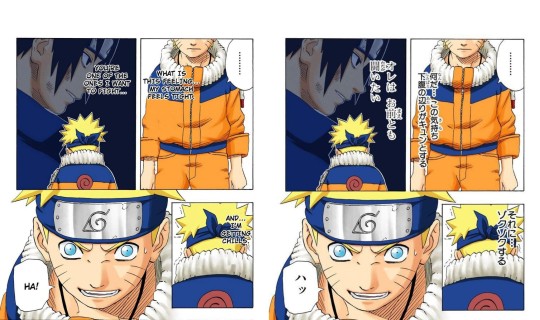
Naruto got existed by the anticipation of fighting sasuke... 「キュン」 Kyun is a common onomatopoeia in Japan when you fall in love and also used for feeling spark or thrill in one's heart. SFX for momentary tightening of one's chest caused by powerful feelings Or to have butterflies. 「ゾクゾクする」 zokuzoku suru- Thrilling is an expression for shaking, to get chills, to be shaking as from joy or excitement Or having tingling sensation (excitement). In here tightening (Kyun) happening in his lower abdomen.
何だ... にの気持ち下腹の辺りがキュンとする それに... ゾクゾクする
nanda... Kono kimochi shita bara no atari ga kyun to suru Sore ni... zokuzoku suru
"What... is this feeling? My lower stomach feels tight/feels butterflies! And... I feel a thrill/ shivers."
This expression is generally uses when butterflies take flight in your stomach when you're sexually aroused. It is that feeling in your stomach when you get turned on. So it literally means he's being sexually excited. In the middle of his thoughts he also remembers when Sasuke tells him he's also interested in fighting him too, where Naruto reacted ドキ ( "doki")
キュン - onomatopoeias that express strong affection (mainly love). The feeling of excitement is like your heart beating hard and constricting. It's similar to when you're so happy you can't breathe. What makes people feel excited varies from person to person.
So, キュン means pounding, fluttered,thump etc... once, instant (ュン feels it is once and gone), a bit light but very sharp (since with キ sound)
-My heart skipped a beat!
- I got this tingling sensation.
- Heartthrob
e. g:
1.その映画で胸キュンしましたか?
sono eiga de mune kyun shimashita ka ?
Did that movie make your heart skip?
2.猫が可愛すぎてキュン死する。
neko ga kawaisugite Kyunshi suru
The cat is so adorable, it's killing me! ( just an exaggeration)
3.この前、あなたの投げキッスに胸がキュンとした。
kono mae, anata no nage kissu ni mune ga kyun to shita.
Last time I saw you, my heart skipped a beat from the kisses you blew (to) me.
4.この絵にキュンとしました 。
kono e ni kyun to shimashita.
I felt a flutter of excitement when I saw this picture.
キュンとした (kyun toshita) has nuances such as "I was touched", " I was moved" , "I was impressed" etc...
[It means you see a picture, and instantly hit by an emotion hard to describe, but it is pleasant]
5.この犬かわいいね。胸がキュンキュンするわ。
kono inu kawaii ne. mune ga kyunkyun suru wa.
What a cute dog! My heart gets pounding.
6.ふとした瞬間の考えてることが一緒なところ。同じタイミングで同じ歌を口ずさんだりすることが���るとキュンとする(笑)
futoshita shunkan no kangaeteru koto ga issho na tokoro. onaji taimingu de onaji uta wo kuchizusan dari suru koto ga aru to kyun to suru
We tend to have the same thoughts at certain moments. It makes my heart flutter when we start humming the same song at the same time (lol)
7.かわいい犬を見て『キュン』 死しそう になった。
kawaii inu wo mite Kyun shishisō ni natta.
When I saw the cute dog I died from cuteness overload.
[N̳o̳t̳e̳:̳ there's no English expression that can be literally translated キュン死 but it can use, “to die from cuteness, to die from cuteness overload, OR so cute that I died”. キュン死 can also be used when you "almost died because someone's too hot,sexy etc., " in that case, the translation be like " die from hotness or sexiness" or something like "he's so hot and I can die". ]
8. 彼女の事を思うと胸がキュンとなる。
kanojo no koto wo omou to mune ga kyun to naru.
When I think about her my heart flutters.
9.何回みても、キュンキュンするね
nan kai mite mo, kyunkyun suru ne
No matter how many times we watch (him), he (still) gives the butterflies, doesn't he?
N̳o̳t̳e̳:̳ キュンキュンする is used to describe a situation where you are so happy that your heart beats fast, or that you find it difficult to breathe in a normal way, etc. It is almost always used for young people being like that, especially when they are meeting somebody they like/ are in love with. Used in a situations when you say: - My heart is aching. - I got this tingling sensation
10. 彼を見るたびに、胸がキュンとする感じがします
kare wo miru tabini, mune ga kyun to suru kan ji ga shimasu
Whenever I see him, I feel a flutter in my chest.
11. 胸がキュンときました。
mune ga kyun tokimashita.
My heart skipped a beat. (N̳o̳t̳e̳:̳ It is often used when a love began or similar emotion. Mune-kyun is an abbreviation for chest-kyun, which means that your chest tightens with excitement.)
N̳o̳t̳e̳:̳ When a person of the opposite sex that you like shows a cute expression just for you, you feel doki. ``Kyun'' is a momentary feeling of happy elation. As you can say, it's a happy feeling when you see something cute. When you see something cute, you use "kyun" to describe the heart-warming emotion you feel at that moment.
There are times when music makes you go 'kyun' or movies makes you go 'kyun'. I think it can also be used in a broader sense. Originally, it was a word used to describe love or the excitement you feel when you meet someone of the opposite sex. However, if you are deeply moved, you will also feel excited, so it is an exciting situation after all.
キュンです (kyundesu) is originally means when your heart pounding / flutters its an exaggerated meaning from onomatopeia キュンキュン (kyunkyun). when you see something cute your chest become painful in love in other words its a word used when your heart beating fast the short term for "my chest pounding!" what kind of situation you can use this is when your heart flutter by the action / words of the person you like or looking at the pet or when you see something cute your heart is pounding / flutters and finally when you're happy its kyundesu.
"Kyun" is an onomatopoeia, so even if you look it up in a dictionary, you may only find a wide range of meanings and uses, or you may find a way of using it that is not mentioned in the dictionary. Ultimately, you have to infer the meaning from the feel of the word and the context.
When Sasuke sees "Itachi", he is suddenly struck by "memories of his older brother"...
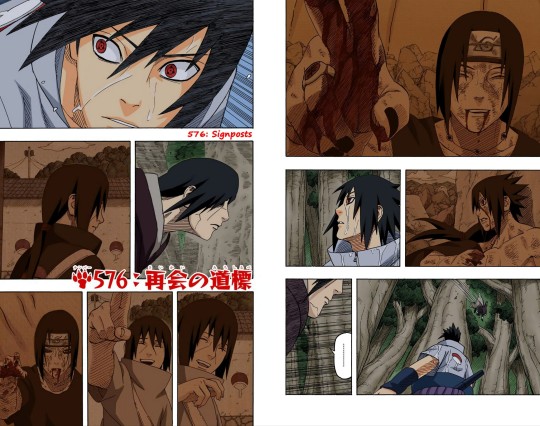
As he Saw the Edo Tensei Itachi's profile he recalled → Itachi's old profile (so distant) → kid Itachi's smiling face from the front (also the forehead poke)→ reaching towards him (thought he would gouge out his eyes)→ his final forehead poke with a smile-> his death
This whole recalled scene have the gap that needed to fill (the truth behind the lies).
Sasuke was obviously surprised & shocked because "someone he thought was dead suddenly appeared in front of him..."
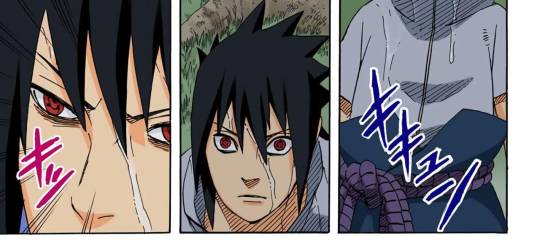
Sasuke goes "kikyun" when he finds his big brother who was dead jumps through the trees in front of him and in the next panel it shows Sasuke's shocked face unable to believe what he just saw, and then instinctively glared towards his brother's direction...
So, キキュン is the sfx that made in his abdomen after seeing his beloved brother for the first time in a long time.
[in the manga it is an effect that conveys emotions, but if they actually added this sound in the anime, I think it would just sound like Sasuke had an upset stomach]
For just a moment, Sasuke has entered a space that is completely cut off from the outside world. Of course, there are no onomatopoeia in the description of the memories he is tracing... it is a world of complete silence. But in a world where even sound is blocked out, it's as if everything has frozen... And Sasuke's eyes are looking somewhere in the distance... he seems to be looking at Itachi, but he's probably not looking anywhere. Sasuke's expression is indescribable... He reminisced about Itachi's past and his abdomen goes "kikyun" because of this unexpected encounter....because he was sure that the person running in front of him was Itachi.
I wonder if this "kikyun" sound actually occurred in the abdomen, or if it is a mental description of "that's how it felt".
"キ (ki) " sound is a "sound" that actually accompanies pain or with a slight pain, like something stabbing you in the stomach and the "kyun" sound is more of a "sensation" that expresses the heart-pounding with joy.
The pain of painful memories + the desire to be with his brother + amid fond memories + the two conflicting emotions of anger and happy + wanted to spend more time with his beloved Brother are all tangled up inside Sasuke= maybe this is how the combination of ki-Kyun happened.
OR
it may be anger. Remember what sai said when he was blaming Sakura before Shikamaru told her about the mission to kill Sasuke in ch. 559, “When I look at Naruto these days I can feel... (his) sadness... and when I think of Sasuke... my stomach gets hot... and I realise that it's anger”. However, I don't think it's anger because that's not the whole meaning of "kyun." And from the panel it wasn't looking like Sasuke was getting angry.
Conclusion: Seeing his brother it brought back old memories of his brother and evoked some strong emotions, making him feel very moved. You can use "kyun" when you are shocked in a positive way. It is clear from the context and from the second page that his abdomen goes kikyun because he was literally shocked. It is enough to evoke strong emotions in anyone if they had seen their brother risen from the dead.
kishi uses "onomatopoeia" and "background" to express their feelings. This technique by Kishimoto is interesting because it allows the reader to use their imagination in various ways. キキュン seems to be an original word created by Kishi and I've never heard anyone using it.
Sasuke tries really hard to talk to Itachi and chase him. How much of a big brother boy is he? He's so cute!! Sasuke suddenly let out all his pent up thoughts and doubts on his brother... That's how much he'd been suffering and carrying it all by himself up until now.
Itachi doesn't show even a trace of his true face in front of Sasuke, that he showed in front of Naruto and the others... Itachi has things he has to do, and he knows very well that "he should never have met Sasuke" because he, who is supposed to be dead, unnecessarily gets involved with Sasuke. Now, he clearly distinguishes between what he should do and what he shouldn't be involved in, and he strictly follows that line... "I'm essentially a dead man... I won't say any more," and keeps running away from Sasuke...
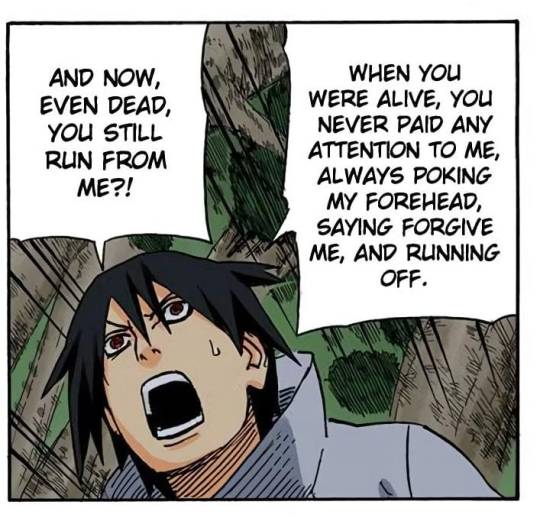
this is a very honest expression of Sasuke's true feelings
Sasuke had always chased after Itachi. he imitated his brother and chased after him. Feeling the responsibility of having the proud Uchiha clan name left to himself, he desperately tried to surpass his brother, chasing after his brother's back, but the more he got to know his brother, the more the wall of "perfection" stood in Sasuke's way. From an early age, he wanted to be acknowledged by his father, and desired to hear from his father "as expected from my son or That's my son" and not "Keep this up just like your older Brother", but his father and others saw him as "Itachi's younger brother" and always being compared to his overly excellent older brother, he was underestimated. But that did not stop him from idolizing his brother. And he loves his brother very much. Even amongst his family members, Sasuke places Itachi on a high pedestal.
But through this unexpected reunion, Sasuke was able to see and understand his brother's "convincing way of life"... even if he couldn't accept it. he returns to his childlike state when he is with his older brother. And Sasuke finally called Itachi "兄さん = big brother". The fact that he can honestly say "Big Brother" means that Sasuke is returning to being the "real Sasuke". Fighting while relying on each other's backs is "proof of teamwork" and finally....showed their trust by standing back to back naturally.
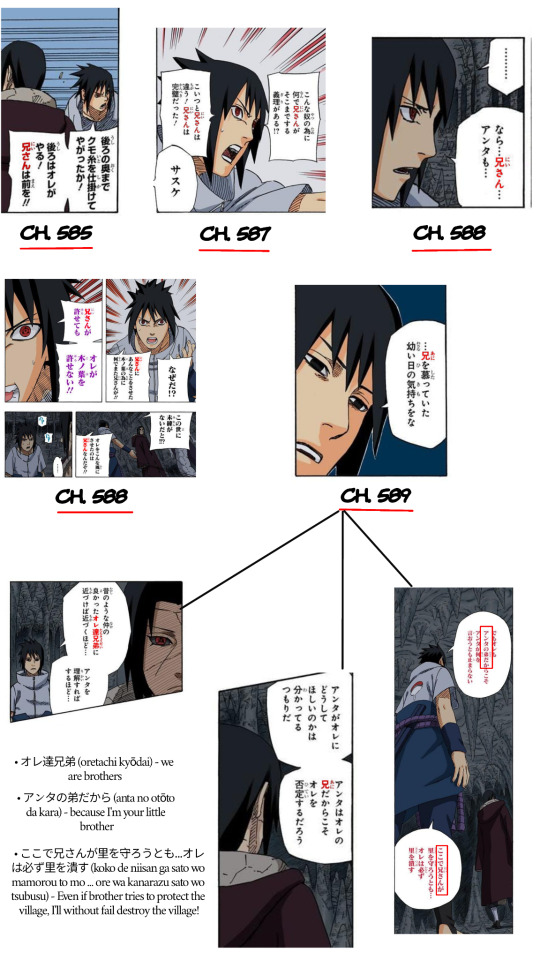
From ch. 585 to ch. 588 Sasuke called him 兄さん。But In Ch. 589 Sasuke uses 兄(あに) = ani= (older) brother...-> is actually formal... It is never used by children, and mostly used in a more formal conversations when you tell someone about your brother, or in literary styles.
With each seal, Sasuke's expression changes... Sasuke may have expected Itachi's reaction, but I think he feels a sense of repulsion and ``as I expected'' towards his brother who, even at this point, refuses to show even the slightest bit of his true self. When Itachi reaches the "Monkey" seal in ch. 589, Sasuke eyes quickly change back from Sharingan to normal. Perhaps he got his Sharingan back to remind himself that their "time as brothers" was over. Itachi, who had been making the seal, stopped... His back was still turned as usual, but he was still listening seriously to what Sasuke was saying.
But when their time as brothers ended, Sasuke finally changed back from "nīsan" to "anta" Or rather, it felt like the dream time ended and he was suddenly pulled back to reality, and then he naturally changed back to "anta."
The way Sasuke talks about his "older brother" in ch. 589 as if he were a third party seems to suggest that he has put his childhood memories behind him as the "past" and is now looking towards the "present and future." It also sounds like he is bidding farewell to his "older brother who has become a thing of the past."
The fact that the Edo Tensei seal ended with the boar , perhaps means that the Edo Tensei came to an end with the brothers' " great boar hunt = Kabuto hunt"
In the end Sasuke (again) called him "nii-san" in his mind, rather than calling him "Itachi" Or "Anta". A 16-year-old Sasuke, the expression on Sasuke's face as he gazed upon his brother reminded him of the innocent 7-year-old when he was looking at his brother's back. a lonely face.
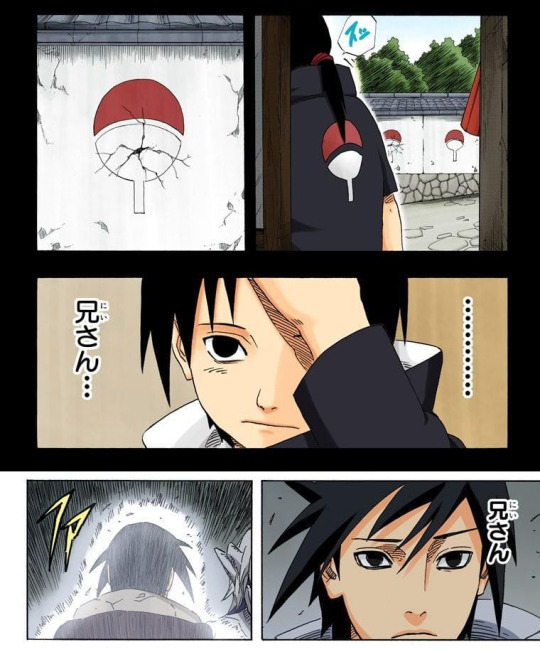
Just like that day... the day of the Uchiha incident, the day Sasuke reminding Itachi to teach Shuriken... he was smiling when he was looking at his brother's back, but then he was saddened to see the broken wall with the Uchiha symbol on it that his brother had destroyed by throwing a shuriken, and muttered in his mind, "Nii-san". The final sweet moment he got from his brother was at that day. Sasuke was probably feeling the same anxiety and sadness he had felt back then when he was only 7-year-old. Even in this last moment his brother was distancing himself from him and running away from him.
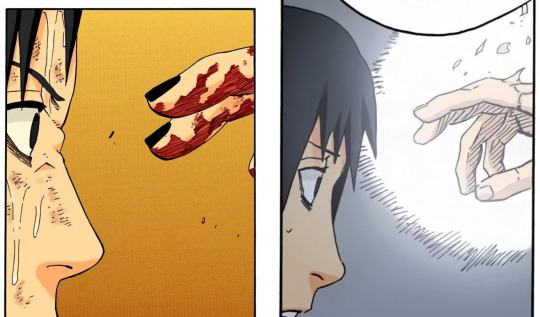
Itachi walks towards Sasuke with his last bit of strength. He looked so panicked as Itachi approaching him and pointed his fingers towards his head, it paralleled the last scene between them, when he thought his brother was going to pluck his eyes out.
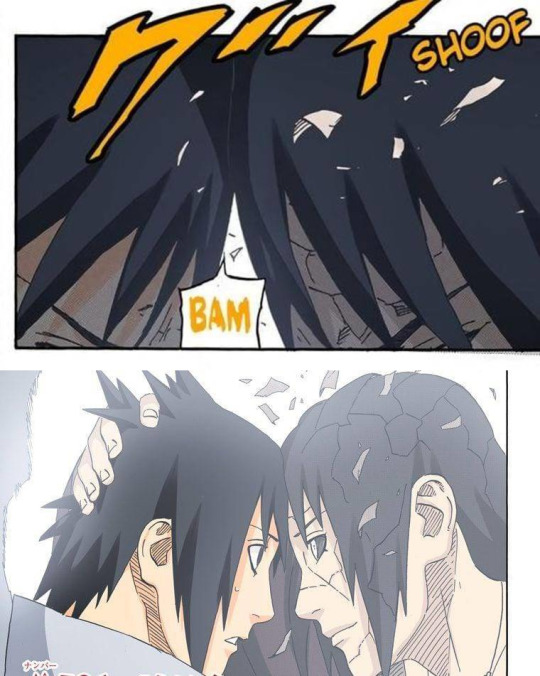
His hand, stretched out as if to flee, passed over Sasuke's head and grabbed him, pulling him towards. Sasuke will never see "Itachi's back" again... This will truly be the last time he sees his brother's back....because this is the Gesture that truly means, 'I am not Lying and I am not distancing myself' instead he closed the distance between them. He no longer pushed Sasuke away with a finger to the forehead. It's a full brotherly embrace now. In Itachi's words, which seem to be honest and straightforward, there is also his "brother's honest feelings" hidden within them. I think that's why he uses the word "always" twice. when he says "I love you," it's unusual for him to use hiragana "おれ (ore) " instead of "オレ." It sounding as gentle and soft as that final smile he gave to Sasuke. Like the gentle words of a mother.
Kishi clearly shows us that Itachi is more than just Sasuke's brother. He established a motherly bond when Itachi was just 5 years old and Sasuke was a newborn baby. We've seen Mikoto carry baby Sasuke and to introduce Kushina. But when it came to a life-threatening situation like the Kyuubi incident, Itachi played the mother role (ch.502). And he checks Sasuke's performance in Academy just like a Father.
Itachi regretted not thinking anything from Sasuke's POV which hurted him even more. He also admitted he tried to use Kotoamastukami against Sasuke himself. He tried to manipulate him, he tried to force Sasuke to follow his own desires, he only saw Sasuke as an object, meant to keep him in the shadows forever. By the end, Itachi confessed his mistakes then stopped trying to force Sasuke into doing anything.
The hand that grabbed Sasuke's head, and said the manly words that he didn't have to forgive " me " forever...He looked straight ahead with gentle eyes and said the embracing words, " I will always love you." It shows the unconditional love between siblings.
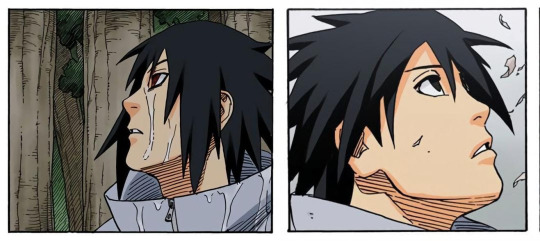
When Sasuke thinks of Itachi, he looks up at the sky. For example, in ch. 403, after hearing the truth about Itachi, he was looking up at the full moon at the Akatsuki hideout.
And when he saw Itachi in the forest, he looked up at his brother's direction... From that moment on, Sasuke entered a "dreamlike time." At that time, he was wandering alone in the darkness, soaking wet like a lost kitten...
But now, he was wrapped in a gentle light, he look up at his older brother as he returns to the sky... He was wrapped in warm love and somehow he looked dazed.
Likewise, Sasuke "looked up" at the beginning of this brother's reunion, and he was "looking up" again at the end of this farewell. Sasuke looks like a little boy who wakes up and realizes his brother is gone. But his brother's "warmth" still remains.
Sasuke's expression has definitely softened compared to before he entered the forest. Itachi's final smile showed that he still believed in Sasuke... it was a clear, happy smile that showed towards his brother. He tells Sasuke only the truth and lets him choose his own path from there. That's a big difference from before.
Sasuke's "love for his older brother" were stronger than Itachi had thought . For his brother, for his family... the "love" in Sasuke's heart was deeper (than expected). Because his love was so great and deep, he ended up carrying more sadness and hatred than he had expected.
In that respect, Naruto understood Sasuke very well. After hearing the truth about Itachi, Naruto said: "Sasuke loved his family and clan... it's because his love is so deep, it's hard for him to forgive"
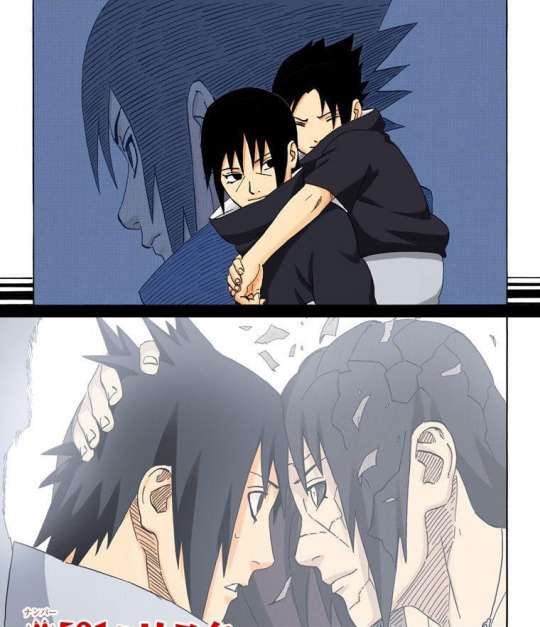
These images and the panels that follow in the manga sum up their relationship perfectly. The panel above is the highlight about the "two brothers" and their story....because Kishi started their flashback with this panel (ch.220)
An older brother carrying his little brother on his back was aware of what was going on around him, but the one behind had closed his eyes and was completely oblivious to what was happening. It's really amusing how Kishi drew it: “Sasuke closed his eyes and Itachi was looking at his brother....fully aware of his surroundings.” Itachi knows what's going on with his clan, but Sasuke is completely kept in the dark and was oblivious, that's the whole story right?
The bottom panel is the beginning of ch. 591. Last moments between siblings. Nothing was hidden now, he heard and saw the truth he wanted to hear from his brother. Itachi's back was no longer turned to his little brother, now he was not ignoring him... he was smiling and putting their head together. It was a true "farewell between the brothers".
So, their sibling relationship had its dark phase, betrayal, hurt, pain and lies. But beyond all that, Sasuke always loved his brother.
In the beginning of the manga, because of his brother's manipulations and lies Sasuke had to live a life full of hatred, suffering, misery and he ended up doesn't care about what happens to him.... BUT...because of Naruto...we saw through Sasuke's monologue at the end of the manga about how he will appreciate and value life. Naruto and Sasuke...they have walked completely different paths, they have experienced and learned similar things in parallel. They both have things they lack and yet.....Naruto makes up for Sasuke's, and Sasuke makes up for Naruto's. That is why they are depicted as equals and balancing each other out. Itachi says himself to Sasuke that he can no longer change sasuke and actually thinks naruto is the one able to. And what can really change sasuke's heart is love. naruto's love. After accepting Naruto's love for him, he hopes to see the world more like naruto. Sasuke also emphasis that Naruto never tried to stop him as anything but as his friend, and because of that, Sasuke was saved. When Sasuke said, "You came closer to my heart" , From those words "You came", Sasuke's gratitude, feelings, and "happiness" towards Naruto are fully conveyed... Now, Sasuke's heart is filled. They understand each other's pain and feelings at a level no one else can, and from a very young age they unknowingly bond with each other over these shared feelings and emotions, and that bond withstood. He is now willing to share the burden of that suffering with Naruto (your sufferings and wishes are passed on to me) just as Naruto tried to do to Sasuke the whole time (I'll bear the burden of your hatred and I'll die with you). Sasuke is willing to try it Naruto's way and accepting him instead of trying to carry the burden and sufferings all alone.
He specifically says in his monologue that he would try to hope for better things to happen, try to find ways to love himself and his life, because if he could do it for Naruto, he could probably do it for himself and other things. and he look for ways to cope with life, and relying on Naruto's love to be able to do so eventually. Because even if he cannot do so ever, at least Naruto will be there for him, always.
And the fact that the last words were not spoken by "Naruto" but by "Sasuke" made you realize once again that the story of NARUTO is not just about "Naruto"... it is a story that has been woven by the two of them, "Naruto and Sasuke"
118 notes
·
View notes
Text
how to clip (redneck ash atthebell edition aka not the most efficient necessarily)
my best methods for clipping & posting to tumblr
tl;dr use clipr for downloading clips from twitch, other methods vary by mileage
Clip on Twitch & Download using Clipr



IMO, this is the best method for posting clips. Twitch clips don't always display properly on Firefox, and it also means that if the clip ceases to exist on Twitch for whatever reason, it's still uploaded to Tumblr. You can also guarantee the quality you're downloading in, which is usually 1080p unless the streamer has for some reason lowered their stream quality (happens by accident sometimes).
Downsides: 1) You have to be able to download the clip to your computer, and doesn't work on mobile. Well, it could, but it would be way more difficult and I don't know why you would do that to yourself. 2) If the moment you want to clip is longer than 60 seconds, you have to use another method. Twitch only lets you clip something that long. I bemoan this fact every day.
Screen capture on your computer

The pros of this method are that you aren't limited to 60 seconds, and if you're trying to clip something from a YouTube video, it's easier than trying to download a YouTube clip (have never been able to successfully do this myself) or downloading the entire video and then editing it down to the moment you want to clip.
The cons are that you have to make sure you're not screen capturing sensitive shit from your own computer, and you have to turn off all other audio and make sure your volume levels & video quality are at appropriate levels (aka don't have your volume super low, don't have the video on 480p if possible). If you're clipping off YouTube, you have to deal with having the channel's watermark in the corner, but otherwise it's great for when you want to just clip something from Twitch but it's longer than 60 seconds.
How to do this (on Windows):
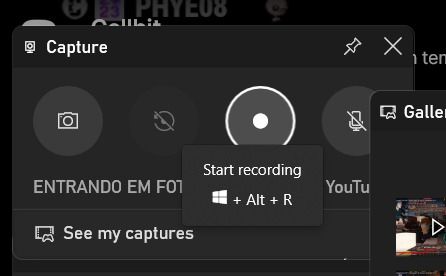
Remember to put your computer on DND (Discord as well) and put the video on highest quality and decent volume levels. Press Windows key + G (if that's your configuration) and select "Start Recording" on the capture window. Remember to give time for the scrub bar and shit from YouTube or Twitch (or whatever) to go away, so go back a little bit before where you want the clip to start. Record until you've got what you want, then open it in whatever video editing software pleases you. You can find the recording in Captures on your computer (usually in some folder chain in Users) or by just pressing Windows key + G again, it'll let you open the recording in file location. I use Microsoft Clipchamp to edit because Windows Media Player crashes my computer and I'm not going to pay for nice editing software rn. Anyway, edit out the bits with you moving your mouse around and the video player UI and get it to whatever length you like. Save or redownload to your computer, upload to Tumblr.
Downloading off Twitter


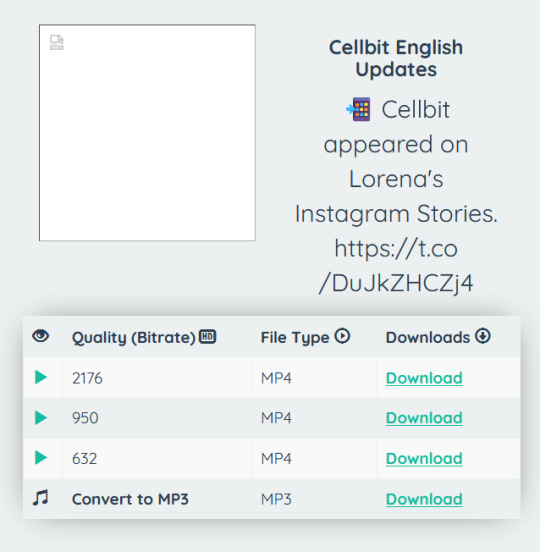
Use twittervideodownloader or twdown. Copy the video address from the video and paste it, then download in whatever quality you'd like. Please attribute said clips, particularly if they went through the trouble of adding subtitles or you're using their translation (or just to let people know where they came from-- i.e. is this from a cc's own IG story, or is it a random fan recording them; the latter means you maybe shouldn't be reposting this video). Translation itself is often a thankless project so it's very appreciated to acknowledge translators. Also if someone else went through the trouble of clipping something, it's just nice to acknowledge them for it. Preferably include a link to the original tweet. This method is best for just needing stuff off Twitter, for IG stories that someone else already screen captured, or if the only clip you can find is on Twitter and the original vod/video is gone for whatever reason.
Extra fun tips:
If you are a frequent clipper, get in the habit of naming your files! If you're keeping them all on your computer, for organization's sake, it will save you SO much time and energy if you just have names on your files. It doesn't have to be anything crazy formal; for example, my format is just "oct 12 cellbit scared by sign tts;" date followed by a very short description.
Similar to the above, it also helps to include some amount of context to clips when you're posting them, particularly if you're not liveblogging. Sometimes people rb clips onto my dash and start freaking out about some kind of lore going on and it's like dude this clip is from two months ago, calm down. Please turn on timestamps also for the love of fuck.
You can download videos straight off Tumblr! If someone else already posted a clip you like and want to have on your computer, you can download it off the dash or off their blog and just have it, no extension or screen capture or website needed. One of the very cool things about this website!
Related, if you really want to find a clip that you know was already posted to Tumblr by someone else, use people's archives. They're also one of the actually functional parts of this website. You can filter by post type, month, and tags, which can usually get you closer to finding what you're looking for than searching will.
RoyalArchivist tends to post and reblog a lot of clips, so they're a good resource alongside myself, pix pixiecaps, and jay cellgatinbo, all of whom clip like maniacs. I also just reblog a lot of things and have a pretty extensive tagging system. RA also has a timestamp archive for QSMP with notes about lore and things-- please check that out if you're interested in helping document events or looking to find a certain moment.
MCYT Archive Project has public vods spreadsheets for QSMP as well as other MCYT projects that are incredibly extensive, so if you're looking for a moment and you remember the date, you should be able to find the vod on the sheet. You can also use the vod archives in junction with wiki articles to figure out exactly or approximately when something happened (the QSMP Miraheze wiki includes citations in their articles, which is a massive help for this kind of thing).
Finally, I am a lunatic who figured this all out through trial and error. There are probably other, somewhat more efficient methods, like I said at the start. If you know of any, please (politely) add onto the post.
#bell.txt#how to clip#whew. okay hope this helps like at least one singular person#tbh i figured a lot of this out just looking it up but i figure it helps for people to see it all in one place
222 notes
·
View notes
Text
(This was originally an ask received through Twitter)
"Back in GloMas (on JP), I think I remember there being a lot of madness surrounding Idia being close to Yuu. I think it’s because he referred to them as ‘Yuu’ rather than ‘Yuu-shi’, but I still don’t quite get it??"
Yes! Honorifics as a whole have already discussed more in-depth here, but Idia does drop his honorific for the prefect once in Glorious Masquerade.
Quick overview for those who may not know: when you don’t use an honorific with someone (-chan / -kun / -sama / etc), this is called yobisute (呼び捨て), written with the kanji for “to call” and “to throw away,” and the word might just not exist in English. It means “to refer to someone without an honorific."


Twst uses honorifics (and yobisute) to track the evolving relationships between the characters.
Deuce, for example, has a line about how he used to yobisute his teachers (i.e. he refused to add “-sensei” to their names) in middle school. To compensate for his past rudeness, Deuce now refers to every single upperclassman by “lastname-senpai.”

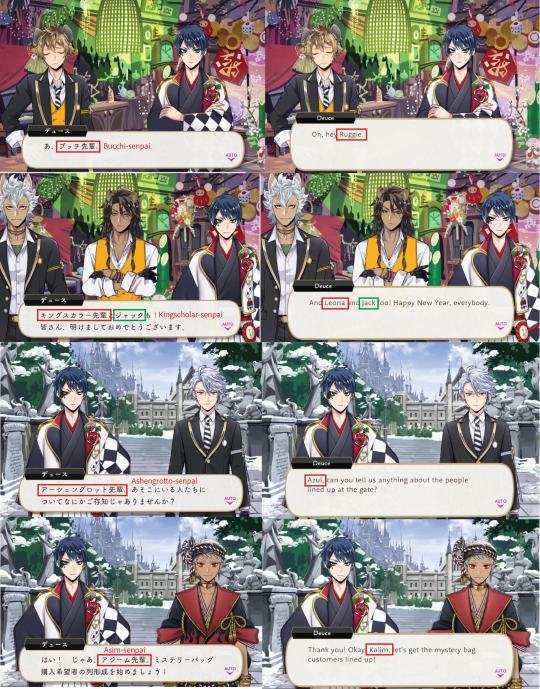

There is even a cute scene during New Year’s where Deuce greets Jamil by calling him Viper-senpai, but after Jamil feeds him an egg salad sandwich he changes—just once—to Jamil-senpai.


Epel is another character whose use of honorifics is significant: Epel is under order from Vil to always use honorifics with everyone. During Book 5 we see him using “-kun” with Deuce, up until Deuce refuses to let Epel fight the bullies trying to steal their blastcycle.
Deuce says that he is the one who took Epel out of the school and so he will be taking responsibility for his actions, and we get Epel’s first “Deuce” yobisute.
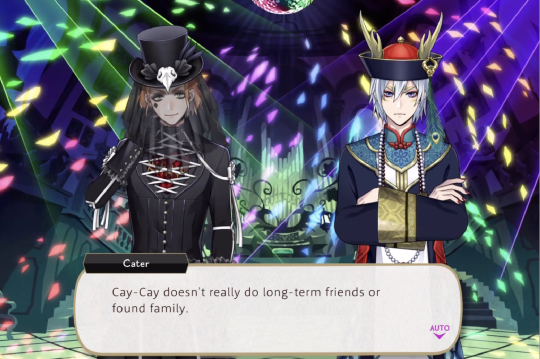
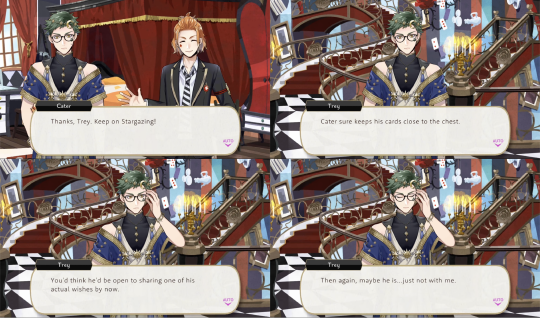
Cater might be the character who weaponizes honorifics the most.
He seems to be using honorifics as an over-familiarity-buffer-zone, as he is actively trying to avoid becoming too close to those around him (re: “Cay-Cay doesn’t really do long-term friends or found family").
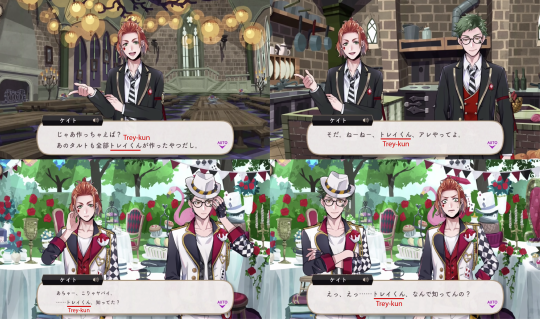
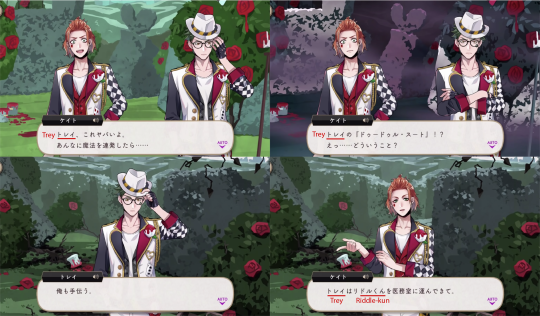
There is one exception to Cater’s rule of honorifics: Trey.
During Book 1 Cater refers to him as “Trey-kun” for the majority of the story, until Riddle’s overblot makes things serious enough for him to drop it and call him “Trey” (even during these scenes, however, he keeps his honorifics for others).
The novel even comments on this directly, saying, "Usually, Cater does not ever yobisute anyone. When he calls to Trey, he always adds ‘kun’ to his name. This is probably one of his skills as a good-natured person. When Cater uses Trey’s name like this, it is only when he is really serious. Only when it is important."
This is all to say that, depending upon the character, yobisute can be a huge deal. It isn’t a black-and-white rule, of course—it varies by each character and their personality.
Kalim, for example, refers to everyone with yobisute, possibly because his status back home meant that he was simply never taught to defer to anyone, and/or because he legitimately considers himself to be close, personal friends with everyone he meets.



Idia is one of those characters like Cater and Deuce for whom yobisute is a big deal. There is exactly one person he refers to without any form of honorific, and that person is Ortho. Much like how he uses his tablet to avoid talking to people face-to-face, he is possibly, intentionally keeping up an over-familiarity-wall like Cater.
The English-language adaptation has translated his honorific of “-shi” as “Mr.,” but it’s actually gender-neutral, which may be why the English-language game’s continuity is so inconsistent, and why the moment of Idia referring to the prefect without an honorific did not make it to EN: while the honorific disappears and reappears in English, he actually uses it to refer to the prefect in Book 6, and it is otherwise in 100% of all of Idia’s dialogue in the original game.
With one exception: Glorious Masquerade.


This is why JP lost its collective mind when it happened (the fan-art is delightful, like this short comic of the characters pointing at Idia and chanting "yobisute"), because it was something Idia had never done before and has never done again, and it was with the prefect!

(This was revealed to be a proof-reading error that was corrected in the 2023 re-release, with "-shi" added to the prefect's name in Idia's dialogue.)
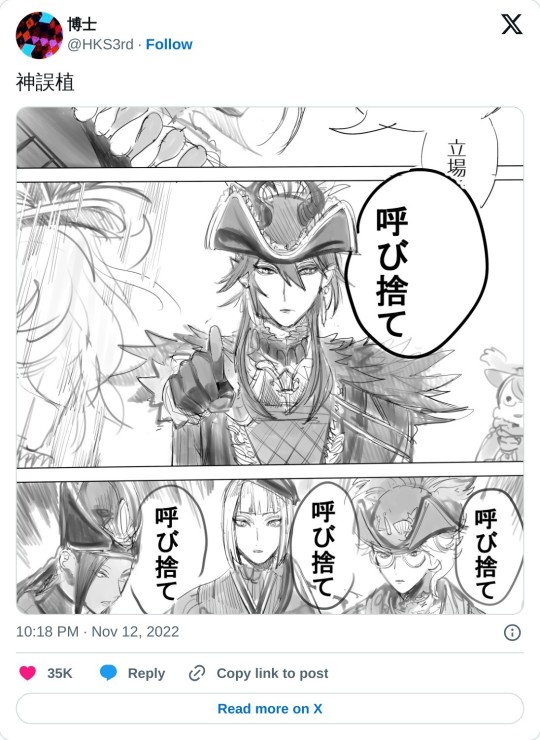
Yobisute is usually very significant in the game, like during Book 6 where Azul, who uses the “-san” honorific with literally everyone except Jade and Floyd, uses yobisute with Riddle when he is in danger, and when Riddle uses it with Leona just before his overblot in Book 2.
But for Idia and the prefect, it was just a proofreading error! :>

270 notes
·
View notes
Text
Ok, Childe as a wuxia/xianxia trope. It's honestly a bit embarrassing how well this fits.
(blame @a-yarn-of-purple-prose for this post and if anyone here is a wuxia fan feel free to correct me, I'm new to the genre)
Wuxia is a Chinese martial arts fantasy genre you are all familiar with. An adjacent genre is called xianxia, "immortal heroes", it ramps all the fantasy elements up to eleven and skews tropes a bit (we'll get back to that).
A common trope is some kind of unorthodox school/sect or technique, allowing to achieve greater power without the usual decades of training. It could be straight-out evil or just revolving around chaos.
Such a martial school is usually called an evil/demonic sect (sect is more like a clan in that setting, not the modern concept of sect) and their techniques tend to drive practitioners to insanity. Either because they are inherently corrupting or because getting too much power without growing as a person is really not the best thing for your mental health. They are also often cast from hp points.
And then there's the archetype of a demonic sect heir. The best pupil or simply someone who has inherited a lost art. Proud, always greedy for more strength, often noble in some weird way.
*points to our calamity of a boy*
Common elements of such stories include:
Falling into some weird realm or meeting a weird person who teaches the hero a Forbidden Technique
Learning a technique too quickly through some sort of magic/alchemy/memory manipulation
Some people are so singular in their pursuit they become insane (走火入魔)
Ambition bad, loyalty and family good
Conflicting loyalties, generally a conflict between a chosen path and personal weaknesses/attachments (could be both ego and familal love, and this is more of a xianxia trope)
Fits like a horoscope so far but wait.
There's a very interesting case of Korean murim genre (their version of wuxia) where sects are less varied (I recommend this post for a basic introduction) and we get three paths:
Justice/Righteous/Orthodox/Light — theoretically they keep the Evil Faction at bay, and protect innocent people, but usually are corrupt to the core
Evil/Unorthodox/Dark — these try gaining as much power as possible and attempt ruling the whole world
Demonic Cult — usually dont take part in evil and justice battles, follow their own code of conduct based on their religion, value strength above all else.
(I'm sure there's a similar distinction in wuxia too, I just can't find it in the deluge of lore)
"Demonic" is closer to "pagan" or "heathen" than Christian idea of demonic here, their beliefs are often based on Zoroastrianism and worshipping a sacred flame. Do you remember all the Persian themes used for Khaenri'ah? And Surtalogi being the flame on Surtr's sword in Norse mythology. I also had the impression that Genshin gnostic references are based on the Zoroastrian-flavoured branch of Gnosticism.
In murim the trope of demonic sect heir is called "heavenly demon" (I believe, a more correct translation would be "supreme heathen"), they are utterly badass, live for the glory of battle, seem more like forces of nature and follow a very strict honour code often conflicting with normal human ethics.
(do I need to spell it out)
TvTropes also says this about Korean stories:
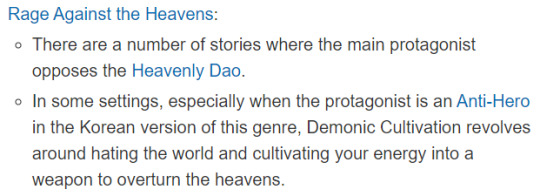
(do I need to spell it out pt.2)
I'm not sure why a Chinese studio would focus on the Korean version of this trope but I'm sure something like this exists in China as well or maybe there's a popular manhwa that inspired authors.
Xianxia extends the fantastic element further, focusing on Taoist concepts and practices and adding all kinds of magical realms (celestial, demonic, etc) and magical beings and making immortality achievable. I still need to read more about it but if I understand that right, demonic heir trope turns into a demon prince in this case. An actual visitor from the demon realm or a practitioner who achieved immortality through dubious means.
These are fae-coded in a way very similar to Childe and have a certain nonchalance towards things most humans would consider traumatic. They are simply not bothered by them, having a different set of morals or faring from a realm that is much worse.
Our boy isn't that (he's still very much human) but he's aesthetically coded like one, same as Scaramouche is yokai-coded, despite not being a yokai.
So. When people say Childe's arc is a reference to Journey to the West, it's not entirely untrue, JttW is the classic of xianxia genre and Childe does belong to the same genre. He, however, is not Sun Wukong but a different, darker trope.
This also explains why he has that "shonen anime protag but not quite" vibe. Shonen was heavily influenced by wuxia but this trope never quite made it to anime or maybe never became popular enough. It's not a deconstruction, it's a different story. Or perhaps a deconstruction of that different story.
#childe#tartaglia#wuxia#my investigation into what the hell this boy is is concluded#this means I'll get to think about something else#many thanks to saoki for indulging my questions for the past two days#there's also an argument for childe being a demon princess rather than a prince but I'm tired#maybe I'll get back to it if anyone wants to meme together#genshin lore tumour#skirk#khaenri'ah#if abyss be thy name I pledge to you my loyalty#I'll need another post to explain how it fits into some scenes#this is already too long
111 notes
·
View notes
Text
Writing Notes: Memory
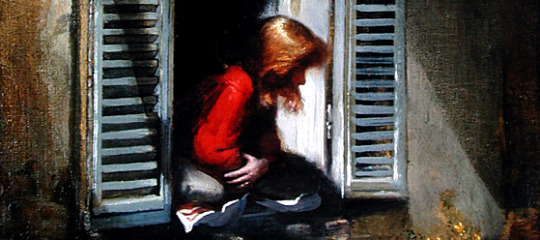
Memory - a single term that reflects a number of different abilities: holding information briefly while working with it (working memory), remembering episodes of one’s life and our general knowledge of facts of the world among other types.
Memory involves 3 processes:
Encoding information – attending to information and relating it to past learning
Storing – maintaining information over time
Retrieving – accessing the information when you need it
The information processing model of memory is a useful way to represent how information from the world is integrated with the knowledge networks of information that already exist in our minds.
Sensory Memory
The part of the memory system in which information is translated from physical energy into neural signals.
This is part of the encoding process.
We receive information from our environment and we must perceive it and attend to it before it can move to our working memory.
Short-Term Memory (working memory)
The part of the memory system in which information can be temporarily stored in the present state of awareness.
This type of memory is limited to 7 items of capacity and 7 to 30 seconds of duration on average.
Long-Term Memory
The part of the memory system in which information can be permanently stored for an extended period of time.
It has a large to unlimited capacity and a duration that may last from minutes to a lifetime.
Semantic Memory
The type of long-term memory about general facts, ideas, or concepts that are not associated with emotions and personal experience.
Episodic Memory
A type of long-term memory about events taking place at a specific time and place in a person’s life.
This memory is contextualized (i.e., where, who, when, why) in relation to events and what they mean emotionally to an individual.
MEMORY FAILURES
Can occur at any stage, leading to forgetting or to having false memories.
The key to improving one’s memory is to improve processes of encoding and to use techniques that guarantee effective retrieval.
Good encoding techniques include:
relating new information to what one already knows,
forming mental images, and
creating associations among information that needs to be remembered.
The key to good retrieval is developing effective cues that will lead the person back to the encoded information.
Classic mnemonic systems can greatly improve one’s memory abilities.
MEMORY & CULTURE
Many of our memories are personal and unique to us but cultural psychologists and researchers have found that the average age of first memories varies up to two years between different cultures.
Researchers believe that enculturation and cultural values influence childhood memories.
Example: The way parents and other adults discuss, or don’t discuss, the events in children’s lives influences the way the children will later remember those events.
Mullen (1994) found that Asian and Asian-American undergraduates’ memories, on average, happened six months later than the Caucasian students’ memories.
These results were repeated in a sample of native Korean participants, only this time the differences were even larger.
The difference between Caucasian participants and native Korean participants was almost 16 months.
Hayne (2000) also found that Asian adults’ first memories were later than Caucasians’ but Maori adults’ (native population from New Zealand) memories reached even further back to around age three.
These results do not mean that Caucasians or Maoris have better memories than Asians but rather people have the types of memories that they need to get along well in the world they inhabit – memories exist within cultural context.
Example: Maori culture is focused on personal history and stories to a greater degree than American culture and Asian culture.
Individualistic & Collectivist Cultures
Differences in memory could also be explained by the values of individualistic and collectivist cultures.
Individualistic cultures tend to be independently oriented with an emphasis on standing out and being unique.
Interpersonal harmony and making the group work is the emphasis of collectivist cultures and the way in which people connect to each other is less often through sharing memories of personal events.
In some cultures, personal memory isn’t nearly as important as it is to people from individualistic cultures.
Source ⚜ Writing Notes & References
#writing notes#memory#psychology#writeblr#dark academia#writing reference#spilled ink#culture#literature#writers on tumblr#writing prompt#poetry#poets on tumblr#writing ideas#writing inspiration#light academia#frank mason#writing resources
44 notes
·
View notes
Text
Watching episode 2 of Ranma reboot and it remains like a blast from the past.
Gonna be posting spoilers and screencaps to talk about it, so all of that's after the jump.


I'm sorry that I didn't appreciate the slapstick of the original manga because Rumiko Takahashi is kind of brilliant at it.
This gag sets you up to think Akane's about to hit him for yelling misogyny at her early in the morning, but then out of absolutely nowhere his fucking dad erupts from the aether and clocks him for it instead.
That's fantastic. It uses the familiar language not just of Ranma and Akane's established dynamic but of tsundere romances in general to set the gag up, and then hits it with a startling and unexpected swerve that still pays it off but in a way the audience didn't see coming.
Speaking of Genma, bits like this:


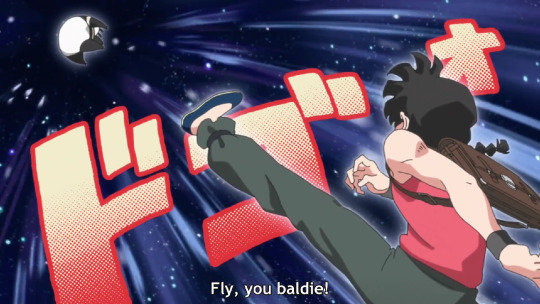
Ranma defeats Genma using the "Look, a distraction!" technique and it's funny because he won with what most martial arts anime would consider a cowardly tactic.
But it's funnier when you know the actual art he practices, 無差別格闘流 musabetsu kakutou-ryuu. Separately translated as either "Anything Goes Style of Martial Arts" or "Indiscriminate Grappling". The latter of which is hilariously specific, as 格闘 kakutou can mean wrestling or grappling but simply refers to weaponless styles of hand-to-hand fighting.
He's a fisticuffs brawler by trade, contrasting the various adversaries he faces throughout the series who are mostly tool- or weapon-based fighters, to varying degrees of esoteric oddity.
But what makes this so funny in hindsight is the "indiscriminate" part. Ranma's martial art is built around the idea that there are no rules and whatever gets you to the finish line is fine. This distraction isn't Ranma being cowardly; It's actually part of his martial art. This is how he was trained to fight. XD



You know, I actually forgot that Dr. Tofu... existed.
But setting that aside, once I remembered who this guy is, I forgot that he's implied to be an exceptionally talented martial artist. Capable of masking his presence so thoroughly that even Ranma can't detect his movements.
That's really interesting. To my recollection, Dr. Tofu never has a single fight in the entire series. Instead, his expertise simply serves as an explanation for his familiarity with all the wild and bizarre mystical maladies that come his way.
It lets him be like, "Oh yeah, the reason you're deathly ill is because someone hit you with the 5,000 year old forbidden Chinese Slow Death Syphilitic Pressure Point technique. Here, let me apply the three-step acupressure reversal technique that was lost to history."
But now I.
I kinda.
Want to see him fight.
(Has this dude been like the DBZA Popo of Ranma 1/2 this entire time?)

HAHAHAHAHAHAHAHA She clocks him with the water kettle to make him respectfully bow.
I did not have the cultural context to understand that joke when I was young.
Rumiko Takahashi is so good at slapstick.
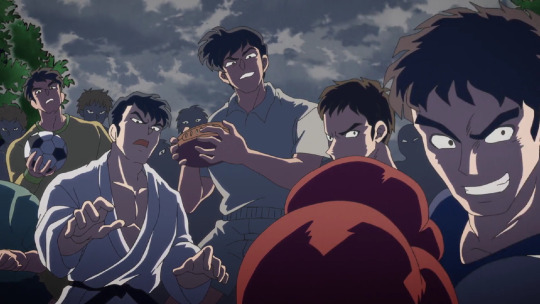


Yeah, okay, I don't remember half of what I said about Akane when I was young but I recant all of it. She is so fucking cool.
Imagine if you had to do this every single morning. Every morning. No exception. Just to get to school. At sixteen.
And keep in mind that this is sexualized violence. These guys are trying to overpower her because they think she'll have to be their girlfriend if they beat her up. Every single one of them is sexually harassing her. With violence.
Fuck this entire situation, y'all. I hope she gives them all life-ruining physical injuries that ruin their ability to get scouted as professional athletes at this critical age and turn them into bitter and misanthropic thirty-somethings whining on the couch about how they peaked in high school.
That's probably not how it actually works in Japan. My American is showing. But nonetheless!

She said "Kuno-senpai". She addresses him formally using his last name because that's a normal thing to do in Japan.
Subtitles, why are you changing the way characters speak to each other? The show is released with a dub and a sub alongside one another. If people are choosing to watching the sub, they don't need you to hold their hand and Americanize it for them.
She correctly calls him Kuno in the dub here. The dub is more accurate than the sub about this line. Don't. Do that.




This guy is such a dweeb he makes Jou-senpai look cool. They nailed Kuno, King Dipshit of the Jackass Mountain Akane has to climb each morning.
This is the guy who came up with the whole "Whoever beats the shit out of Akane may claim her as their trophy" thing. He probably watches Andrew Tate videos and writes internet screeds asking why women don't respect his authority and strength. Fuck this guy.


Seriously. He just. Said this. About some girl in another class. And the boys in the school were all like, "Oh, yeah, that sounds reasonable. First one to break her leg gets the girl! Thanks for showing me the best way to express my masculinity, bruh!"
A wacky setup for Akane's personal background but also a chillingly accurate metaphor for how the Manosphere functions.
For his part, it's pretty clear that what Kuno is attracted to is martial strength. He becomes interested in the "Mystery Girl" that appeared after Ranma "fled" pretty much right after she beats his ass.




He's kind of an interesting parallel to Shampoo in that regard. I never really thought of that before, but both of their interests are predicated on how strong Ranma is.
He also makes for an interesting dynamic for Ranma, from a gender perspective. Ranma's curse and the constant menace of Kuno forces Ranma to endure firsthand the kind of harassment that Akane has to undergo in her day-to-day life.

Of course, this being Ranma 1/2, Ranma's going to be getting that from both genders throughout the series. Rumiko Takahashi created a harem dodecahedron for her story, with Ranma and Akane being beset not just by rival suitors but also by rival suitors for their rival suitors trying to kill them and win the rival suitors' love.
Kuno's just one of the crowd.
But it was nonetheless an interesting choice to give Ranma a toxic male harasser as one of his suitors, that speaks to the interesting gender dynamics at play in the series.
One last thing. Something I really love about Ranma 1/2 is the way it uniquely changes the experience of just. Being around water. Like, the ever-presence of water especially in an island nation such as Japan is a constant threat.



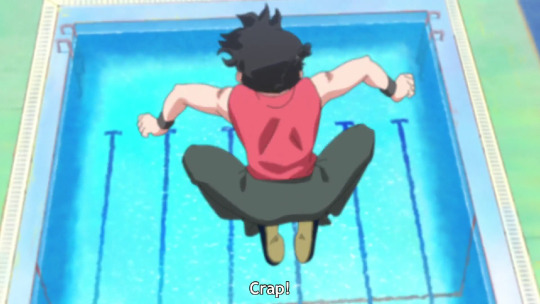
You really don't think about how much water there is in everyday life until you have a Jusenkyou curse.
31 notes
·
View notes
Note
oooh ok feel free to ignore this since it isn't the ask game technically, but how do you feel tamsyn pulls punches with john? where do you think that could improve? i'm curious and i love hearing ur analysis of this stuff
ok so this is just my own personal opinion. but after reading the series like three times ive basically come to the consensus that tamsyn is much more in tune with writing john as kiwi and not as maori
and its not that is completely erased from the text. but you REALLY have to hunt for it as opposed to him being kiwi which is incredibly obvious in the way he talks about his old life in ntn. i dont think i would have even known he was maori if she didnt say gideon was and i was actively looking for it. but she kind of treats characters being indigenous as like a cool fun fact rather than an active part of their identity. and this is related to a much longer and more draining conversation about how race/ethnicity even WORKS in the empire which is set 10000 years in the future. we as a society Right Now cant even agree on what race cleopatra was do you like. get what im saying
anyway what im trying to get at is the empire, designed and run by One Guy, the Only person who remembers earth culture, actively deciding to model its systems of government, religion, military, language and aesthetics after staples of western imperialism (like most of the names are pulled from greek or roman or biblical figures) is one thing. because i understand the books are actively christian, tamsyn is catholic theres like Commentary on those elements. but there is no commentary as to why a polynesian guy would Actively gatekeep his own culture from a world HE made. they are clearly speaking english, gideons name had to be TRANSLATED to kiriona, theres a decent chance shes not even pronouncing it correctly. thats fucking insane. the characters in tlt are living in a cultural genocide by magnitudes that we cannot even comprehend and they cant even like. talk about it they cant THINK about it. the text hasnt given them time to. does he think theyre not worth it? why not? these are questions the text isnt interested in asking let alone answering
even when theres an opportunity for contrast, ie new rho, its all done in broad strokes of vague descriptions of Other cultures. we suffer speaks in accented house. what accent? pyrrha can speak 4 languages including house to varying degrees. what languages? she makes pikelets in the morning this is obviously a very nz/aussie thing, so this wartorn city Also has them theyre just a universal constant. new rho is just kind of described as Apocalypse Desert City, it could look like fucking LA for all i know and nothing would change
tldr tamsyn wrote very good kiwi characters and im obviously talking as someone who isnt kiwi but Is not white but her like aversion or indifference to writing inarguably indigenous characters in a way outside of their physical appearance wrt how it informs their ideals and motivations could be more. just More. this is literally one of the most insanely cruel things john has done and nobody in universe can even call him on it because hes scrubbed all traces of it from existence what if we exploded
#like look at me#if judith was white what would change#What#if JOHN was white would change#aside from the implications#teh implications the text refuses to Look at#asks#bisexualmaedhros#its even evident in how she calls harrow and gideon mixed maori#when thats like. not really a thing from my understanding they dont quantify it like that#you Are or you Arent#why specify it like that what does it Mean
46 notes
·
View notes
Text
Below the cut there will be the translation of the notes Bagi posted yesterday that ak!bagi has been taking.
TIMELINE OF THE THINGS I DISCOVERED:
(probably – almost sure- the events are still in the wrong order, I will fix it with time!)
Bia and Jota were friends since they were young
2004 – The “disaster from 20 years ago” happens (maybe the thousand dead from the hole?)
1000 dead in the hole at the island we found, it was an old mine and it was explored until there was nothing left (FIRST TIME THEY FOUND THE MASK CAVE)
Grew up
Jota’s family dies under suspicious circumstances (in a fire that didn’t have ashes and they didn’t find the bodies) (FIX POSITION IN THE TIMELINE)
Bia (?) used to stay at the house by the city hall side, saying words in different unknow languages and the people created rumors about the scary things that were happening there. (for example, a mysterious fire in the houses)
Mayor Jota goes overseas (FIX THE POSITION IN THE TIMELINE)???
Jota and Bia begin to hate each other
Bia begins to be accused of witchcraft by everyone.
2016 – Jota is elected mayor (FIX POSITION IN THE TIMELINE)
2020 – More than 100 people (residents? visitors?) die from stomachache in a type of intoxication (maybe they died because they refused to wear the masks? In theory at this point of the timeline the masks “didn’t exist/weren’t used” but it’s a possibility)
Jota tries to learn languages very different from the common (like Bia, maybe trying to learn the same type of “magic” that she knows)
Island residents receive the “masks”, and the mayor asks that everyone wear them for their own protection (FOR WHAT REASON DID THEY ONLY MADE USE OF THE MASKS NOW? JOTA LEARNED TO USE MAGIC AT THIS POINT? MAYBE HE FOUGHT WITH BIA BECAUSE SHE WANTED TO STOP HIM?)
Bia is “exiled” from the island – event more interpreted as Bia being rejected, hated and despised by everyone in Valigma (because of the mayor?)
IMPORTANT DETAIL ABOUT BIA: known in the city for being a troublemaker and causing too much trouble… but for what reason did she do that? Vengeance? Bothering to make the people go against the mayor? Delay the mayor for some kind of plan? Is she trying to get OUR attention???
The masks have difference expressions/feelings. There are masks of different colors (Bia = pink, factory owner = blue, etc)
Alice said that she feels “comfortable” with the mask – maybe the mask represents how she feels? Or it makes her feel protected because she has an idea of why she wears it? Is she being controlled or manipulated to say those things? (poor thing…)
I believe the masks might be used for one of two things: 1. To stop the Valigma residents from dying/getting sick because of the contamination of the city (in this case the mask would have some kind of protection spell?) or 2. To get the Valigma residents with some kind of ancestral magic that is present in those caves, maybe to have control of all the Valigma residents in some way? But one thing is clear: the mask is directly involved with the magic and rituals that Bia already knew and that Jota was/is trying to learn.
I tried to take off Quel’s mask (Bia’s mask) and I COULDN’T. Is it stuck forever after you put it on?
“I hope the mayor knows what he is doing” – Who wrote that?
Pay attention to when I receive information from Hugo and remember to NOT reveal their identity to anybody
Masks
Everyone in Valigma has one!
Residents wear them by order of the mayor Jota.
Are used for “protection” of who is wearing it – Have spells on them?
Even the residents that are not in Valigma were wearing masks! For example, the ones in the docks that got our tickets to the boat, the captain, Bia, etc (THIS MEANS THAT EVERY VALIGMANO >HAS< TO WEAR THEM? – for what reason?)
They vary in expressions and some in color (pink, blue and that horrible re one from the banker) (THE COLOR AND EXPRESSION ARE TIED TO THE FEELINGS AND HIERARCHY OF THE WEARER?)
Red masks: any “neutral” mask can go red depending on the situation? Or the one from the banker didn’t change colors and he actually changed masks? – The eye turned red too!
They are similar to the expressions/symbols at the wall of the mines cave – place where their design was born (and power right, if there is one)
Is there somebody in Valigma who never wore the mask and IS ALIVE?
Are the masks a way of escaping the “punishment” from the earth for exploring the resources in a predatory way?
The main question is: in the deep part of the mine there is a place with a cauldron and some potions. Would that be the place where the magic was used for the first time? Or the place where it was discovered?
The factory is involved with the magic USE part? – They don’t look directly connected until no, even if both sides are suspect as hell. The factory looks like it’s being used to “keep” this magic? (TAKE MORE PICTURES AND INVESTIGATE THE INTERIOR – DO IT IN SILENCE BECAUSE OTHERS WERE CAUGHT INVADING BEFORE)
Remember to take a invisibility potion (my old friend) and some books! Stealing a gun would be important too
GUESS 1
The masks could have been created as a combination of technology from the factory and the magic that the earth had in it’s depths.
In this hypothesis, there would be an explanation of the motive that took them SO MANY years for the masks to be created, because it was necessary machinery to extract the power of the earth + transform it in a technology that could be used by the Valigma residents (the masks)
Bia would have been a strong opposition to mayor Jota, since she probably knew of magic e was even a defender of the power that the earth had. In a situation like that, the mayor and the factory wouldn’t be the “villain” because they were only trying to make the city survive in some way, and neither would Bia be the “villain” because she was trying to protect what she believed in and maybe the cost of that would be the Valigma residents paying with their lives for the predatory exploration their ancestors made.
In all of this, the mayor’s family could have died in a failed attempt of the mayor Jota of manipulating the magic inside his house since Bia refused to help (because she knew his intentions)
Guess 2
Bia was responsible for bringing magic to Valigma and that might have caused a collapse.
In an attempt of solving the problem, the owner of the factory worked in some kind of technology to use or even neutralize the magic – that would explain the good relationship between the mayor and the owner of the factory and the horrible relationship between him and Bia, even more if Bia is involved somehow in the death if mayor J’s family.
That huge machinery in the factory is full of “purple energy” is extracting/removing energy (or magic) of Valigma’s soil?
Would that explain the different mask colors?
Bia = pink
Factory owner = blue
Would they be different sides of a conflict? In this case, would the mayor and the city at th side of the factory owner in this conflict?
IN BOTH POSSIBILITIES, all of this started for the same reason: they tried to extract too much from the mines and from the earth, and messed with something they shouldn’t.
Who is the true villain behind the contamination of Valigma? The factory or the supposed rituals?
There is a problem in all of that… A question without answer. For what reason mayor Jota wants so bad to learn magic? The same magic that took the life of his family and made the Valigma residents miserable…
I will have to ask
(don’t die!)
NEXT STEPS
Speak with the mayor and ask for answers about his study of languages and the use of this magic, rituals and the things that he supposedly tried to manipulate by following Bia’s footsteps
Invade the factory to find details about how it works
Use the permission that Jorge gave me to investigate the police archives
Look for more details about the death of mayor jota’s family
Get a sample of the water from the lake for analysis and think of a possible antidote in case the contamination proves to be fatal
Get an animal and use as a test subject, giving it water from the lake. I will also test it in some plants. If it doesn’t work, try to find a human subject that is not wearing a mask (POSSIBILITY OF DEATH)
Verify the situation of the health of the grave keeper Gomez in the next days, because he drank some of the water from the toilet in Bira’s bar (he should be fine since he uses the mask) Do not encourage other resident to do the same because it may get in the way of the experiment. Just the subject Gomez may have ingested the water to be sure that the problem is in the water or to confirm that protection from the contamination is on the mask.
LOOK FOR BIA RAUX. She is the oly one who has the answers.
Do not die.
46 notes
·
View notes
Note
What do you think of complaints about Pat being mistakenly remembered as "soft"? More specifically, about him being more warlike than gentle
Oh, dear, you're making me talk about something significant to me. Get ready for a long text! I know it took me a while to respond (more than a month), but life was busy and since this is a topic I like, I didn't want to respond without due attention.
First of all, a few details:
I'm not an academic! This is a hobby!
I tried to bring the academic interpretations I found regarding Patroclus' kindness, especially those I agree with. After all, the post is about what I think, right? It is not necessary to agree with all of them, interpretations are interpretations. The intention was just to show how this characteristic was exploited by people. Likewise, my interpretation is also ONLY my interpretation.
There are some moments where Greek texts (The Iliad and scholia bT) were used and there was a kind of translation of words. Note that I obviously don't know any form of Greek! The method used to arrive at the result will be explained. In any case, it's just to get an IDEA of what was said, it isn't a super serious translation. Please don't quote me on this. If you have any corrections on this aspect, I'm open to them!

Homeric epithets
First of all, what is an epithet? Anyone who reads Homer has probably read/heard this word a considerable number of times, but what is the explanation for this term? Speaking very simply, the term came from Greek and basically refers to a characteristic of the character. This characteristic can refer to the character's appearance, personality, ability, function, ancestry or place of origin. Among the possible reasons for the use of epithets, it has been suggested that they are ornamental resources, that they seek to complement the structure of the poem (in the sense of quantity and organization of the verses) and that they have literary relevance in the development of the character — information taken from Frederico Loureço's introductory text of The Iliad in Portuguese, with the third case being his suggestion. They’re considered formulaic in the sense that they have a ready-made structure that can be fitted into the poem, and the idea of formulas in Homeric epic is generally accepted as a result of oral tradition because it facilitates oral recitation without losing the poetic quality. Even if you had never heard this word before, if you read Homer you certainly noticed its existence. For example, perhaps you noticed how many times Menelaus is emphasized by the color of his hair (in Greek, xanthus. In English translations, it varies). This is because this is one of Menelaus' epithets, in this case referring to his appearance. Some other examples are:
Their appearance (ex: Ajax with aka “giant/gigantic”)
Their abilities (ex: Achilles with “swift-footed” as an example of physical ability and Odysseus with “tactician” as an example of intellectual ability)
Their role (ex: Agamemnon with "lord of men/shepherd of people" because he’s the leader of the Achaean army)
Their ancestrality (ex: Diomedes with aka "Tydeus' son")

The gentle epithet in The Iliad
Regarding epithets, Patroclus was portrayed as gentle by Homer. He may not be what we see as "gentle" today because a soldier isn't exactly the picture of gentleness in modern times, but by the standards of the time and even among Homeric characters, Patroclus was considered gentle. This isn't an interpretive case, it's something that is evident in the text of The Iliad.
When Menelaus announces the death of Patroclus, this is how he describes him:
Much he enjoined on Meriones and the Aiantes: “Aiantes, leaders of the Argives, and Meriones, now let you each be mindful of gentle, unhappy Patroclus, for to all men he knew to be kind while he was alive; and now death and fate have swallowed him.”
The Iliad, 17.698-672. Translation by Caroline Alexander.
In Greek, the sentence in which Menelaus refers to Patroclus as kind is:
Αἴαντ' Ἀργείων ἡγήτορε Μηριόνη τε νῦν τις ἐνηείης [gentle/kind] Πατροκλῆος δειλοῖο 670 μνησάσθω: [gentleness/kindness] πᾶσιν γὰρ ἐπίστατο μείλιχος εἶναι ζωὸς ἐών: νῦν αὖ θάνατος καὶ μοῖρα κιχάνει.
The Iliad, 17.669-672.
When thinking about the fate of mortals, this is how Zeus describes Patroclus:
And as from afar Zeus who gathers the clouds saw him arrayed in the armor of the godlike son of Peleus, shaking his head he addressed his own heart: 200 “Ah, poor wretch, death troubles your heart not at all, death which is now close by you; you are putting on the immortal armor of a noble man, before whom all others tremble. His companion you have slain was both strong and gentle, and you were not right to take the armor from his head and shoulders. But yet I will hand you now great victory, compensation for this—that Andromache will not receive you safe-returned from fighting, nor the famous armor of the son of Peleus.”
The Iliad, 17.198-209. Translation by Caroline Alexander.
In Greek, the sentence in which Zeus refers to Patroclus as kind is:
τὸν δ' ὡς οὖν ἀπάνευθεν ἴδεν νεφεληγερέτα Ζεὺς τεύχεσι Πηλεί̈δαο κορυσσόμενον θείοιο, κινήσας ῥα κάρη προτὶ ὃν μυθήσατο θυμόν: 200 ἆ δείλ' οὐδέ τί τοι θάνατος καταθύμιός ἐστιν ὃς δή τοι σχεδὸν εἶσι: σὺ δ' ἄμβροτα τεύχεα δύνεις ἀνδρὸς ἀριστῆος, τόν τε τρομέουσι καὶ ἄλλοι: τοῦ δὴ ἑταῖρον ἔπεφνες ἐνηέα [gentle/kind] τε κρατερόν τε, τεύχεα δ' οὐ κατὰ κόσμον ἀπὸ κρατός τε καὶ ὤμων 205 εἵλευ: ἀτάρ τοι νῦν γε μέγα κράτος ἐγγυαλίξω, τῶν ποινὴν ὅ τοι οὔ τι μάχης ἐκνοστήσαντι δέξεται Ἀνδρομάχη κλυτὰ τεύχεα Πηλεί̈ωνος.
The Iliad, 17.198-207.
When mourning the death of Patroclus, Briseis said:
“[...] So now I mourn your death — I will never stop — you were always kind."
The Iliad, 19.355. Translation by Caroline Alexander.
In Greek, the sentence in which Briseis refers to Patroclus as kind is:
ἐς Φθίην, δαίσειν δὲ γάμον μετὰ Μυρμιδόνεσσι. τώ σ' ἄμοτον κλαίω τεθνηότα μείλιχον αἰεί. [always gentle/kind]
The Iliad, 19.299-300.
One of Priam's sons, Lycaon, when begging to be spared by Achilles appeals to the memory of Patroclus and describes him thus:
“[...] I will escape your hands, since some divine force has brought me to this place. Yet I will say one other thing to you, and put this within your heart; do not kill me, since I am not born of the same womb as Hector, who slew your strong and gentle comrade.”
The Iliad, 21.93-96. Translation by Caroline Alexander.
In Greek, the sentence in which Lycaon refers to Patroclus as kind is:
ἄλλο δέ τοι ἐρέω, σὺ δ' ἐνὶ φρεσὶ βάλλεο σῇσι: μή με κτεῖν', ἐπεὶ οὐχ ὁμογάστριος Ἕκτορός εἰμι, ὅς τοι ἑταῖρον ἔπεφνεν ἐνηέα [gentle/kind] τε κρατερόν τε. ὣς ἄρα μιν Πριάμοιο προσηύδα φαίδιμος υἱὸς
The Iliad, 21.94-97.
The narrator also describes him as kind, most notably when he says that the Achaeans are mourning Patroclus:
So he spoke, and the men obeyed the swift-footed son of Peleus. And first they extinguished the pyre with dark-gleaming wine, everywhere the flame reached and the ash had fallen deep; and, weeping, they gathered up the white bones of their gentle comrade [...]
The Iliad, 23.249-252. Translation by Caroline Alexander.
ὣς ἔφαθ', οἳ δ' ἐπίθοντο ποδώκεϊ Πηλεί̈ωνι. πρῶτον μὲν κατὰ πυρκαϊὴν σβέσαν αἴθοπι οἴνῳ ὅσσον ἐπὶ φλὸξ ἦλθε, βαθεῖα δὲ κάππεσε τέφρη: κλαίοντες δ' ἑτάροιο ἐνηέος [gentle companion/kind comrade] ὀστέα λευκὰ
The Iliad, 23.249-252.
And Achilles:
[...] “Son of Atreus and you other strong-greaved Achaeans, these prizes are set down in assembly and await the horsemen. If we Achaeans were now contending in honor of any other man, I myself would surely carry these to my shelter after coming first; for you all know by how much my horses are superior in speed. For they are immortal, and Poseidon gave them to my father Peleus, and he in turn gave them into my hands. But as it is I will stay here, as will my single-hoofed horses; for such was the charioteer whose noble strength they lost, so kind, who many a time poured limpid oil upon their manes, after washing them with shining water. They both stand grieving for him, and their manes hang upon the ground, they both stand grieving in their hearts. But the rest of you throughout the army, ready yourselves, whoever of you trusts his horses and his bolted chariot.”
The Iliad, 23.272.-286. Translation by Caroline Alexander.
ἀλλ' ἤτοι μὲν ἐγὼ μενέω καὶ μώνυχες ἵπποι: τοίου γὰρ κλέος ἐσθλὸν ἀπώλεσαν ἡνιόχοιο ἠπίου [gentle/kind], ὅς σφωϊν μάλα πολλάκις ὑγρὸν ἔλαιον χαιτάων κατέχευε λοέσσας ὕδατι λευκῷ.
The Iliad, 23.279-282.
Achilles, Menelaus, Briseis, Lycaon, Zeus and the narrator related Patroclus to kindness. So I highly doubt that Patroclus being described as kind is just an opinion, it really does seem like a character trait to me. In the case of conventional epithets of male characters, they're big, they're fast, they have an important lineage, they play a big role. Patroclus has epithets like these too. He is "descendent of Zeus” (διογενές), he is "Menoetius' son" (Μενοιτιάδης), he is "great-hearted" (μεγαλήτωρ). And yet he’s the only one who has the epithet "gentle". It’s common for characters to receive personality-related epithets regarding their smartness or their courage, but Patroclus also receives “gentle”. This actually caught some attention in academic circles!

Scholia bT of The Iliad
First, why not start with the Greek scholia of Homer? More specifically, an ancient scholia, currently untranslated. Even earlier, the emphasis on the gentleness of Patroclus was noted in the scholia written by Greeks, it isn't an emphasis that only emerged with non-Greek scholarship. It's also interesting because some of the modern scholars I'll mention have used these texts as references, you will notice this when they cite things like Scholia bT.
For the Greek text, I consulted the Scaifer Viewer. For those interested, I'll list the sections of this website from which I took the excerpts. This scholia doesn't have a complete translation, only some parts were translated in specific contexts and (for those who read lost fragments of authors, you have probably already read part of it; for example, in the fragments attributed to Hesiod). For those that I was able to find translations, I used the translation and gave credit. For those that I didn't find translated, I “”“translated””” in a very improvised way with the help of dictionaries, automatic translators and academic texts that summarized the excerpt. Although I tried to capture the general idea of the excerpt (that is, what is being explained), this doesn't even remotely attempt to be a faithful translations in terms of grammar and language.
Taken from section 5.1.192.
〈Μενοιτιάδῃ⟩] εἰκότως τῷ Ἀχιλλεῖ θυμικῷ ὄντι ἤπιος ὢν [*] Πάτροκλος πάρεστι πρὸς τὸ τὸν θυμὸν αὐτοῦ μαλάσσειν. ὅτι δὲ πρᾷός ἐστι, δῆλον ἐξ ὧν οἰκτείρει τοὺς Ἀχαιούς· Εὐρύπυλον ἰᾶται, καὶ Μενέλαος περὶ αὐτοῦ φησι νῦν τις ἐνηείης Πατροκλῆος—μεμνή σθω” (Il. 17. 670)· κατʼ ἐξοχὴν δὲ ἰδιαζόντως εἶπε περὶ αὐτοῦ, ἵνα ἀξιόχρεως ᾖ, τελευτῶν ἐγείρειν αὐτὸν εἰς τὴν μάχην. Patroclus, the son of Menoetius, being gentle, is fittingly present beside Achilles, who is prone to anger, in order to soothe his spirit. That he’s gentle is clear from the fact that he feels pity for the Achaeans, he heals Eurypylus and Menelaus speaks about him saying, “remember the gentle Patroclus” (Il. 17.670). He spoke about him in a particularly distinct and personal way, so that he might be worthy, ending with the exhortation to rouse him into battle.
[Improvised translation, don't quote me for this if the subject is complete accuracy]
General idea: The schoalist argues that Patroclus having kindness as a personality trait is clear and he gave as argumentative examples Patroclus' compassion for the Achaeans (note: this is especially demonstrated at the beginning of Book 16, but had already been portrayed in Book 11. Probably hinted in Book 9 as well, given Phoenix's story about Meleager in which Cleopatra is parallel to Patroclus), the way he heals Eurypylus (note: see Book 11) and the way Menelaus encourages the Greeks by reminding them that Patroclus was kind (note: see Book 17). He also interprets that Patroclus being shown in scenes alongside Achilles is appropriate, as his kindness is supposed to soften Achilles' anger.
▁▁▁▁▁▁▁▁▁▁▁▁▁▁▁▁▁▁▁▁▁▁
Taken from section 5.1.205.
Πάτροκλος δὲ φίλῳ] τὸ ἤπιον αὐτοῦ διὰ τῆς σιωπῆς τῆς νῦν τε κἀν ὅλῃ τῇ στάσει κἀν τῷ μηνιθμῷ δείκνυται· καὶ νῦν δὲ οὐ φθέγγεται, ἵνα μὴ ἢ παροξυντικός. Patroclus, however, shows his gentler nature through the silence both now and in the entire situation and in the month; and now he does not speak, so as not to be provocative.
[Improvised translation, don't quote me for this if the subject is complete accuracy]
General idea: The scholiast interprets Patroclus being silent as a sign of his gentle nature. This part is specifically about Book 1, where while Achilles is visibly angered by the situation Patroclus is a silent figure and his only role in this part is to obey Achilles' order to bring Briseis. Apparently, the idea is that Patroclus doesn't speak in front of the men sent by Agamemnon so as not to be provocative; perhaps it refers to him not making any comment about the situation so as not to incite Achilles's anger even more.
▁▁▁▁▁▁▁▁▁▁▁▁▁▁▁▁▁▁▁▁▁▁
Taken from section 5.11.390
ληίδα δʼ ἐκ πεδίου] αἰδήμων ὁ Πάτροκλος· ἐπειγόμενος 〈γὰρ〉 ἀνέχεται τοῦ ��έροντος μακρολογοῦντος· οἰκονομικῶς δὲ πέπλασται τῷ ποιητῇ ἡ μακρὰ διήγησις, ἵνα ὁ Εὐρύπυλος ἐκ τῆς μάχης φθάσας ἐλθεῖν περιτύχῃ Πατρόκλῳ, καὶ παρὰ τούτῳ 〈αὐτοῦ〉 ἐμβραδύνοντος δεινὴ γένηται ἡ τειχομαχία· εἰ γὰρ ταχέως ἐπανῆλθε πρὸς Ἀχιλλέα καὶ ἐκπεμφθῆναι ἑαυτὸν ἔπεισεν εἰς τὴν μάχην, ἀνῃρέθη ἂν ἡ τιχομαχία, δι’ ἣν ἐπλάσθη τὸ τεῖχος. Patroclus is respectful: for, although he is in a hurry, he puts up with the old man when he is speaking for such a long time. The long narration is crafted economically by the poet, so that Eurypylus, who returns early from the battle encounters Patroclus, and slows down in his presence on account of the wall-fight. For if he had returned quickly to Achilles and had persuaded him to send him to the battle, the wall-fight, for which the wall has been introduced, would have been taken away.
[Translation by Jonas Grethlein]
General Idea: In Book 11, Patroclus encounters Nestor, who is as verbose as ever, although Patroclus is impatient given the circumstances. The schoalist interprets Patroclus as being particularly respectful because, although he's in a hurry, he entertains Nestor for a long time in his conversation. The schoalist later comments on the economy of the narrative in the way it is structured.
▁▁▁▁▁▁▁▁▁▁▁▁▁▁▁▁▁▁▁▁▁▁
Taken from section 5.11.385
[...] §. ἔστι δὲ μείλιχος Πάτροκλος· διὸ ἱστάμενος αἰδεῖται τὸν γέροντα (649). [...] Patroclus is indeed gentle; therefore, standing there, he feels shame before the elder."
[Improvised translation, don't quote me for this if the subject is complete accuracy]
General idea (parts cut in [...] for reasons of uncertain translation on my part): this part is about the interaction between Nestor and Patroclus in Book 11. The scholiast initially (in the cut part) appears to comment on Nestor's advising speeches, eventually interpreting that Patroclus is kind in the way he behaves because he demonstrates humility and respect in front of an older person.
▁▁▁▁▁▁▁▁▁▁▁▁▁▁▁▁▁▁▁▁▁▁
Taken from section 6.16.2
δάκρυα θερμά] εἰκότως ὁ πρᾶος Πάτροκλος κλαίει, τὰ μὲν [*] ἀκοῇ τὰ δὲ αὐτοψεὶ τῶν δεινῶν ἐπισκοπήσας. διὸ οὐδὲ φθέγξασθαί τι οἷός τε ἐστὶ συγκεχυμένος ὑπὸ τῶν δακρύων, ἀλλὰ σιωπῶν ἵσταται διὰ τοῦ σχήματος τὸν ἔλεον ἐπαγόμενος. καὶ ἐν ταῖς Λιταῖς (Il. 9.433) ὁ Φοῖνιξ “δάκρυʼ ἀναπρήσας· περὶ γὰρ δίε νηυσὶν Ἀχαιῶν.” *μελάνυδρος] ἡ βαθύυδρος, ᾗ κατὰ τοὺς φυσικοὺς μέλαν ἐστὶ [*] τὸ ὕδωρ. The gentle Patroclus laments appropriately, since he has both heard and seen terrible things. So he is not able to cry out, being overwhelmed by his tears, but stands in silence, bringing pity upon himself because of his appearance. Similarly in the Litai (Iliad 9.433) Phoenix “burst into tears, for he feared greatly for the Greek ships” Melanidros] the deep water, in which according to the naturalists is black water.
[Translation from British Library]
General Idea: In Book 16, Patroclus runs crying to Achilles after hearing more news about the horrific events happening to his companions. He, however, says nothing until Achilles asks him why he is crying, at which point Patroclus explains the situation and begs Achilles to have compassion. The schoalist interprets this scene as Patroclus's initial silence occurring because he is overwhelmed by his own emotions, associating his empathy with his kindness. He compares this to the scene in Book 9 where Phoenix is concerned about the way the Trojans are increasingly advancing on the Greek ships. Furthermore, he notes that the term used in Greek refers to dark water in the sense of symbolizing deep water, indicating that Patroclus's tears are deep.
▁▁▁▁▁▁▁▁▁▁▁▁▁▁▁▁▁▁▁▁▁▁
Taken from section 6.16.5
[...] οἱ μὲν σκληροὶ τοὺς ἐπιεικεῖς καὶ πρᾴους γυναιξὶν εἰκάζουσιν, οἱ δὲ ἐπιεικεῖς τοὺς στερεοὺς ἀγρίους καὶ ἀνημέρους φασίν. καὶ νῦν ὁ μὲν Ἀχιλλεὺς τὸν Πάτροκλον ὡς κόρην, ὁ δὲ Πάτροκλος τὸν Ἀχιλλέα ὡς πετρῶν παῖδα (35). [...] The harsh/hard/severe ones liken the gentle/kind and mild to women, while the gentle/kind ones say the harsh/hard/severe ones are wild and untamed. And now, Achilles regards Patroclus as a girl, while Patroclus sees Achilles as a child of stone.
[Improvised translation, don't quote me for this if the subject is complete accuracy]
General idea, including the part I removed (where it says [...]) because I couldn't find a sufficiently comprehensible translation: the scholiast discusses the scene in Book 16 in which Patroclus begs Achilles to be more compassionate, to which Achilles responds by comparing Patroclus to a little girl begging for her mother's attention because he is crying. Patroclus, in turn, says that Achilles is not the son of either Thetis or Peleus, but of the sea and rocks. The scholiast interprets this dialogue as portraying the idea that a man who behaved compassionately was sometimes compared to a woman because this type of compassion was associated with femininity, while gentle people saw harsh people as so hard-hearted that they seemed to distance themselves from a certain idea of humanity. Therefore, the scholiast's interpretation is that when Achilles compares Patroclus to a little girl, he is thus mocking his compassionate tears by saying that he sounds effeminate. When Patroclus says that Achilles was born of the sea and rocks, he is thus saying that Achilles at this point has so little compassion that it is as if he had not been generated by people. Achilles then criticizes Patroclus's gentle behavior (note: ironically, Achilles later praises this trait in Patroclus when he comments about the horses missing their kind caretaker. Whether this was a case of "giving value after losing" or whether Achilles only said it in the first place because he was hot-headed, it's up to each person's interpretation).
▁▁▁▁▁▁▁▁▁▁▁▁▁▁▁▁▁▁▁▁▁▁
Taken from section 4.21.44:
ἐνηέα ] ἐν τῷ ἐπιθέτῳ τοῦ φίλου μαλάσσειν αὐτὸν οἴεται , διδάσκων ζηλοῦν τὴν σήνειαν τοῦ φίλου . Gente/kind: with this epithet of Akhilleus' friend he thinks he may soften him, by teaching him to emulate his friend's kindness.
[Translation by Nicholas Richardson]
General idea: this is a scene from Book 21 in which the Trojan Lycaon begs Achilles to show mercy and mentions Patroclus, characterizing him as kind. In the scholiast's interpretation, this was an attempt by Lycaon to bring out in Achilles a feeling of trying to emulate the kindness of his deceased friend.

Patroclus “gentle” epithet in The Iliad in modern analyse
Cambridge University has published The Iliad: A Commentary Series, a 6-volume series of books that aims to analyze all the books of The Iliad in detail. The volumes are:
Volume 1: Analysis of Books 1-4 by George S. Kirk.
Volume 2: Analysis of Books 5-8 by George S. Kirk.
Volume 3: Analysis of Books 9-12 by Bryan Hainsworth.
Volume 4: Analysis of Books 13-16 by Richard Janko.
Volume 5: Analysis of Books 17-20 by Mark E. Edwards.
Volume 6: Analysis of Books 21-24 by Nicholas Richardson.
Some of these volumes contain analyses of Patroclus's kindness! I will list them here, and the notes in “[]” are my additions, that is, they aren't from the original text. This is because the original text sometimes uses Greek (obviously), but without necessarily indicating what the Greek term means, which can be confusing. The meanings I gave were based on online Greek dictionaries and the translations that I know of the scenes mentioned.
While analyzing Book 9 of The Iliad, Bryan Hainsworth mentions how the scholia bT emphasizes Patroclus' kindness in scenes from this moment. In case you don’t remember, this is the book where we have the embassy sent by Agamemnon (consisting of Odysseus, Big Ajax and Phoenix) visiting Achilles in an attempt to convince him to return. Patroclus is largely a silent presence in this book — he is shown listening to the music that Achilles plays, he prepares food for Achilles and the guests, he silently listens to each of their arguments, he obeys Achilles when he asks Patroclus to prepare a place for Phoenix to sleep, and finally he is shown sleeping. According to Hainsworth:
205 Patroklos makes no reply. bT make this a point of characterization, cf their remark at 11.616, σιωπηλὸς ἀεὶ καὶ ἐνηὴς Πάτροκλος. His self-effacing and gentle nature (ἐνηείη, 17.670) is often praised by the exegetical scholia (bT at 1.307, 337, 345). Kindliness, like other co-operative virtues, is appropriate between friends, but there is no reason why it should be shown to enemies; Patroklos displays his mettle in book 16. In spite of his disapproval of Akhilleus' present attitude towards his friends, which surfaces at 16.29-35, respect for his superior in rank keeps Patroklos silent at this point. His silence is, of course, necessary if Akhilleus is to maintain his present stance.
The Iliad: A Commentary - Volume V: Books 9-12 pg 90.
While analyzing Book 17 of The Iliad, Mark W. Edwards refers to Patroclus' kindness as unique in the entire poem. But note that he is talking about language; he isn’t implying that there are no other kind characters (Menelaus, for example, is constantly used as an example of Homeric kindness and is even compared to Patroclus in academic circles), but rather referring to how Patroclus is explicitly referred to as kind. This book, in case you don't remember, shows the Achaeans (especially Menelaus and Ajax) trying to recover Patroclus while Hector encourages the Trojans and allies to recover the body because he wants to feed the corpse to the dogs. According to Edwards:
669-73 On 669 see 507-8n. The two Aiantes were fighting side by side at 531-2. TIS (670) refers to all the Greeks, not just the three leaders he addresses. ἐνήης [Note: kind/gentle] is used of Patroklos by Zeus at 204 21.96 and 23.252; otherwise only by Nestor of himself in proximity to a reference to Patroklos (23.648, cf. 646), and of Athene disguised as a friendly Phacacian (Od. 8.200). The usages suggest that it may have been a conventional epithet for ἑταῖρος [Note: hetaîros. This word has more than one meaning, but in translations into English they generally use "companion"], in the II. restricted to Patroklos for artistic reasons. Similarly, the form δειλοῖο [Note: miserable/wretched/poor, but in a compassionate sense] is used only in this formula for Patroklos (here and 3 × in book 23), and he is the only person to whom μείλιχος [Note: meílikhos. Gentle/kind] is applied, here and when Briseis says that he was μείλιχος aiɛí [Note: always gentle/kind] (19.300; it is used with a negative for Hektor by Andromakhe, 24.739). Patroklos' gentleness is unique in the language of the poem, and seems to be recognized in the unusual number of direct addresses to him by the narrator. [...]
The Iliad: A Commentary - Volume V: Books 17-20, pg 127.
In his analysis of Book 21, Nicholas Richardson again cites the scholia bT to point out that Lycaon, by referring to Patroclus as kind, was trying to remind Achilles of his friend's kindness as a way for Achilles to follow Patroclus' example. Ironically, the mention of Patroclus didn’t make Achilles kinder, but rather made him angrier. According to Richardson:
96 ἐνηέα [gentle/kind]: 'with this epithet of Akhilleus' friend he thinks he may soften him, by teaching him to emulate his friend's kindness' (bT). Ironically, the reference to Patroklos' death only sparks off Akhilleus' bitter reply. The verse echoes 17.204, in the speech by Zeus prophesying Hektor's death, when he puts on Akhilleus’ armour after killing Patroklos, and the epithet is nearly always applied to Patroklos in the poem (see on 23.252).
The Iliad: A Commentary - Volume VI: Books 21-24, pg 61.
Richardson, while analyzing passages from Book 23 of The Iliad, also emphasizes Patroclus' epithets. In particular, he notes the combination of "gentle", only applied to Patroclus, with "companion", thus forming "gentle companion" (ἑτάροιο ἐνηέος), even more restricted to Patroclus. This part, in case you don't remember, refers to the funeral. In addition, he also analyzes the part in which Achilles describes Patroclus' treatment of the horses. According to Richardson:
973-86 Akhilleus' speech appropriately introduces the first and most important contest, by referring to the supremacy of his own horses (cf.2.770), and to the loss of Patroklos, their driver. This reference is developed pathetically with the reminiscence of his gentle care for them and of their grief for him, a motif which recalls 17.426-56 and 19.400-24.
The Iliad: A Commentary - Volume VI: Books 21-24, pg 205.
252 ἑτάροιο ἐνηέος [note: gentle companion] almost exclusively of Patroklos in Il.; cf. 17.204, 21.96 ἑταῖρον [note: hetaîros. companion] . . . ἐνηέα [note: gentle], 17.670 ενηείης Πατροκληος [note: gentle Patroclus. The “Πατροκληος” is his name], and once of Nestor at 23.648, just after a reference to Patroklos (see comment).
The Iliad: A Commentary - Volume VI: Books 21-24, pg 199.
Richardson (yes, the same Richardson), in a critical study of the exegetical scholia of the Iliad (the bT scholia is part of this) published in The Classical Quarterly in 1980, notes how scholiasts viewed the text as a whole and analyzed it with the idea that even the smallest details had a purpose. To illustrate this, Richardson uses the scholastics' interpretations of Patroclus' role in the narrative, including his kindness:
This is an elaboration of the Aristotelian view which the Scholia follow, and they do not put it so explicitly. But they do assume that the poet has a clear idea from the beginning of the direction in which his narrative is moving. It is particularly illuminating to see how they comment on the role of Patroclus in the poem. He is first mentioned at 1.307, when Achilles returns with him and his companions to their tents after the quarrel. Here they note that his introduction at this early point in the narrative already prepares the way for his later intervention to plead with Achilles to return to the battle. Again the fact that Achilles entrusts Briseis to him (337) indicates their closeness, and his silence here (345) is picked up in the Embassy by the way he remains in the background, which suggests his gentleness (BT 1.307, 337, 345). The Scholia compare his healing of Eurypylus, his distress at the Greek misfortunes, and the description of him as 'gentle' by Menelaus (17.670). When we come to the series of events leading up to Patroclus' intervention, they are fully aware of the careful way in which this is prepared. The wounding of the heroes in Book 11 leads to the Greek rout and battle by the ships (BT 11.318, 407, 598). Machaon goes back to the ships in his chariot when wounded, and so passes Achilles' view rapidly: Achilles therefore sends Patroclus to find out what has happened (BT 11.512; cf. ABT 11.604). Achilles has been watching the battle from his ship, clearly longing for the moment when he can return (BT 11.600). Patroclus goes to Nestor, and this ensures that Nestor's eloquence will succeed where the Embassy had failed (AB 11.611). Nestor's long story is designed οἰκονομικῶς, i.e. as part of the poet's plan, because this gives time for Eurypylus to return and meet Patroclus. This delays Patroclus and allows the poet to introduce the battle at the wall which follows (BT 11.677-8, 809). Patroclus is respectful (αἰδήμων), and so he listens politely, in spite of the urgency of the situation. The wounding of Machaon has removed the doctor who could have treated Eurypylus, and so Patroclus does so instead (T 11.833; cf. also BT 11.813). His kindness leads him to stay with Eurypylus after treating him (BT 12.1). Finally, we return to Patroclus and Eurypylus at 15.390, when great battle has made the Greek plight far more desperate and P sympathy for them all the greater (BT 15.390 and 12.1). Later, death, Hector drags his body in order to cut off his head and gi the dogs (17.125-7). This barbaric intention is often overlooked observe that it helps to justify Achilles' mistreatment of Hector’s body (BT 17.126-7). Whether or not Achilles is justified the motif surely to his retaliation.
Literary Criticism in the Exegetical Scholia to the Iliad: A Sketch, pg 268-269.
When addressing how scholiasts seemed to interpret each character, Richardson once again highlights their tendency to emphasize Patroclus' gentleness, while commenting that this contrasts with the portrayal of Paris, who is not violent but is cowardly (something Patroclus is not), and Agamemnon, who is noble but has an arrogant personality (also not so typical of Patroclus, although here I should remember that in Book 16 Patroclus does indeed display arrogance. However, we will address this separately). In turn, Menelaus is seen as a similar figure to Patroclus in the narrative. He also mentions the apostrophes, which is an interesting point, but I'll address this separately as well.
[...]They are quick to observe points of characterization of the individual heroes. Patroclus' gentleness has already been noted (cf. also BT 11.616, 670, 677-8, 814, 12.1, 19.297). The poet's sympathy for him is shown by his use of apostrophe, addressing him in the vocative (BT 16.692-3, 787; cf. Eustathius 1086.49). He uses the same device for Menelaus: προσπέπονθε δὲ Μενελάῳ ὁ ποιητής (ΒΤ 4.127; cf. 146, 7.104, Τ 13.603). The Scholia regard him as a moderate and gentle character (BT 6.51, 62), who evokes the sympathy of his companions (BT 4.154, 207, 5.565, 7.122). He is called a 'soft fighter' (17.588), but this is said by an enemy and is not the poet's own view (ABT). His φιλοτιμία is displayed in his dispute with Antilochus after the chariot-race (BT 23.566). Paris is contrasted with him, as cowardly, effeminate, and disliked by his own people (BT 3.19, AB 3.371, Porphyry ap. B 3.441 quoting Aristotle, fr. 150, BT 4.207, 5.565, 6.509, etc.). Agamemnon is also contrasted, as noble and commanding, but arrogant and brutal: the Scholia reflect attempts to defend him from criticism, as he is the Greek leader and so ought to be a model of kingship, but they cannot whitewash him entirely (cf. especially BT 1.225, and T 1.32, ABT 2.478, BT 6.58, 62). His defeatist speeches to the army, suggesting return home, are interpreted as having a covert intention which is the opposite of their apparent one (Porphyry ap. B 2.73, BT 2.110 ff., 9.11, 14.75). This may be true of 2.110 ff., but fails to convince us that Agamemnon is not being portrayed as a weak and vacillating leader later.
Literary Criticism in the Exegetical Scholia to the Iliad: A Sketch, pg 272-273.
In a 1972 Harvard Studies in Classical Philology journal, Adam Parry wrote Language and Characterization in Homer, where at one point he emphasized how the language of The Iliad seems to highlight Patroclus’s gentleness. He mentions the use of apostrophes (again, I’ll get into this later) and mentioned how the descriptive μείλιχος (gentle) appears in the text, but in terms of the character only Patroclus receives such a description (at other times, it’s used to describe things and not people). The word ἐνηής, which Parry translates as “goodness,” appears 5 times in The Iliad, 4 of which are about Patroclus.
The case of apostrophe must be more complex than either the traditional or the modern view suggests. Let us consider the three characters with whom apostrophe is especially associated. Before book 16, Patroclus plays a part in books 1, 9, 11, and 15, being mentioned by name or patronym in those books twenty-one times. Apostrophe, however, is used for him only in book 16, where it occurs six times, always at significant points of the action. The special place Patroclus occupies in the organization of the poem scarcely needs comment. This place, in our poem, depends on his character. He is the sweetest and most compassionate of the Homeric warriors. We see this most clearly in the moving lament for him spoken by Briseis in 19.282-300, where she says of him: “When Achilles slew my husband, you would not let me cry. You promised to make me Achilles’ wedded wife, to bring me back to Phthia, and to give me a marriage feast there, among the Myrmidons. And so now with all my heart I weep for your death, for you were always sweet” ---τῶ σ᾽ ἄμοτον κλαίω τεθνηότα μείλιχον αἰεί. μείλιχον is in this sense a word reserved for Patroclus in the Iliad. Elsewhere it is used almost entirely to mean “‘gentle words” as opposed to “harsh” (10 times), the other two occurrences being ironic — ‘“‘he was no gentle fighter in battle.’’ Only Patroclus as a man is μείλιχος, and the distinctive word defines that quality in him which ensures his death and with it the tragic plot of the poem.
Menelaus also signals this quality when in 17.669 he calls for help in protecting the body of Patroclus: “Ajax, you and your brother, and Meriones, let us remember the goodness of unhappy Patroclus; he was able to be sweet (μείλιχος) to everyone, while he was alive; now death and doom have found him.” The word I translate as “goodness” is ἐνηής. Of its five occurrences in the Iiad, four refer to Patroclus. The single exception is in 23.648 where the egotistical Nestor speaks of himself, and here the adjective occurs immediately after Nestor has himself spoken of Patroclus, so that some process of association appears likely. To Patroclus is attributed in the poem a distinct character: kind, easily moved to pity, remarkably free from the sort of heroic self-assertion which many, and recently Professor Adkins, have sought to define for us. This character is manifested in the poem not only by his actions, but also by a distinct vocabulary.
Language and Characterization in Homer, pg 10-11.
BONUS: James P. Holoka, in his edition of Simone Weil’s The Poem of Force, not only follows Edwards’s idea that Patroclus’s gentleness is linguistically unique but also emphasizes his duality as a kind person yet a formidable warrior. He mentions this because Weil, the author of the poem he is commenting on, at one point considers Patroclus the only soldier who showed any restraint regarding strength, describing him as “knowing how to be sweet to everybody” in a likely reference to Menelaus’s description of Patroclus in Book 17. Holoka says:
“[...] Only Patroclus is an exception in the Iliad. Though a most formidable warrior, he also has the capacity for kindness; cf. Edwards (1991): “he is the only person to whom μείλιχος [“gentle”] is applied, here [17.671] and when Briseis says that he was μείλιχοναἰεί. [“always gentle”] (19.300; it is used with a negative for Hektor by Andromakhe, 24.739). Patroklos’ gentleness is unique in the language of the poem...
Simone Weil’s The Iliad or The Poem of Force: A Critical Edition, pg 94.
This is a bonus because I haven't read Simone Weil's entire text, so I can't say I agree with her. It's different from the more pointed analyses of others here, it's a text with a very interconnected context. I only read the text around the Patroclus part and didn't quite agree with the thinking there, but that could very well be because I didn't read it with the complete context.

Apostrophes in The Iliad
Homer intentionally emphasized this characteristic of Patroclus and never treated it as a weakness, but rather as a quality. Gentle or kind only appears describing Patroclus after his death — Menelaus and Briseis feel affected by Patroclus' death because he was kind to them, Zeus talks about how Hector is destined to die for having killed Patroclus while associating Patroclus with kindness and strength, Lycaon tries to win Achilles' mercy by remembering that Patroclus was kind, Achilles speaks of his horses' grief at losing a kind charioteer, the Acheans mourns a lost companion who was kind. The preserved memory of Patroclus by those who mourn or speak of his death isn’t just his strength or his courage, but his gentleness. This makes me think that the choice to make Patroclus the only hero to receive this type of epithet is precisely to aggravate the tragedy of his destiny — Achilles was the most affected, but he wasn’t the only one to mourn between the characters and even the listener/reader.
This seems even more the case given the number of times Homer uses apostrophes with Patroclus. And again, even if you don't know what the term apostrophe means, you've certainly noticed its presence in the text just as you did with epithets. Depending on the situation, you may have even thought about it! At least, I've seen posts where people talked about it without knowing the specific term, but they remarkably understood the spirit of the thing. This is great because I think that getting the spirit of the thing without knowing what the thing is called is preferable to knowing what the thing is called but not understanding it. Basically, this word is the name for when the poet refers directly to the character, almost as if he were talking to him instead of narrating in the third person as he did throughout the entire poem. Menelaus and Patroclus are the characters in which this narrative device was used the most, with Menelaus it was 7 times and with Patroclus it was 8 times. In particular, this draws the reader's sympathy to the character being referred to.
In a text published in The Center of Hellenic Studies, entitled Revisiting the Apostrophes to Patroclus in Iliad 16, Emily Allen-Hornblower conceptualizes the narrative use of apostrophes:
Apostrophes in Homeric poetry—those instances where the poet addresses a character directly in the vocative—are “embarrassing” for the reader and critic. The apostrophe disrupts the flow of the third-person narrative by bringing the poet, performer, and audience in direct contact with one of the characters. To what end? In the Iliad, the overwhelming majority of apostrophes are addressed to Patroclus (8 times, all of them in book 16) and Menelaus (7 times). Much like a historical present, they take the listener into the here-and-now of the scene, creating a sense of greater proximity with the character being thus addressed. Scholars since Antiquity have interpreted these apostrophes as expressions of particular concern on the part of the poet for the characters in question. The fact that the majority of apostrophes are principally directed at Patroclus and Menelaus is seen as a reflection of the fact that these are the two heroes that the poem represents as “unusually sensitive and worthy of the audience’s sympathy.” No doubt the large number of apostrophes directed at Patroclus, all confined to book 16, contributes to heighten the pathos and overall emotional effect of his excruciatingly slow and horrible death at the hands of Apollo at the end of the book.
Thus, Allen-Hornblower is theorizing through the idea that apostrophes seek to induce sympathy in the reader. When we think of the characters in which this device is most used, Menelaus and Patroclus, this really makes sense. Menelaus is the one who wants to be reunited with his wife after many years, we should sympathize with the pain of a husband who is so desperate that he has reached the point of putting himself at excessive risk even knowing the consequences (an example of this is when Menelaus readily offers to duel Hector in Book 7, even though Hector's martial superiority is known. He has to be stopped by Agamemnon). Patroclus is the character whose death is extremely important and is the catalyst for one of the climaxes of the war. We should sympathize with the empathy that made him want to fight alongside his companions and sympathize with Achilles' pain so that we can understand why this death made him act when nothing else did.
It's also no coincidence that Menelaus and Patroclus are by far the most sympathetic characters in the Achaean army. I have already given enough evidence for Patroclus, but there are also clues for Menelaus and I will illustrate them here as a way to try to make the Allen-Hornblower concept even more understandable. For example, although Menelaus in theory is the one who should feel the most negative feelings towards Troy, in a scene in Book 6 Menelaus is willing to spare a Trojan and the Trojan would have lived if it were not for the interference of Agamemnon, who is much less “soft” than Menelaus in the Homeric text. In Book 23, despite being angry with Antilochus’s trickery, he easily forgives him. This characterization of Menelaus as a person we should sympathize with continues in The Odyssey. In a text where hospitality is a big theme, Menelaus is portrayed as the perfect host. He is quick to provide gracious hospitality, unlike Polyphemus and Circe, but is also quick to allow his visitor to leave if that is what he wishes, unlike Calypso. Still someone we can empathize with, Menelaus is portrayed as mourning his brother, Agamemnon. Although the characterization of Menelaus has changed in other Greek texts, the Homeric Menelaus, at least to my mind, is a kind and sympathetic character given the social context.
Allen-Hornblower argues that, in the case of Patroclus, the apostrophes help to build the impending tragedy of his aristeia. For contextualization purposes, aristeia is when a character proves himself to be an aristo, that is, the best. For example, Achilles' aristeia is his return to battle after Patroclus' death, and Diomedes' aristeia includes his clash with Ares and Aphrodite. Patroclus' aristeia is sometimes called Patrocleia/Patrokleia. Allen-Hornblower's idea can be seen through the moments in which the device is applied. The first of these appears at the beginning of Book 16, when Homer writes “Then groaning deeply you addressed him, rider Patroclus” (16.20) and they only increase throughout the narrative of Patrocleia. More specifically, they become even more evident the closer Patroclus is to death and begin precisely with his request to Achilles, since the request is the catalyst for his death. They are an emotional element that makes the audience sympathize with the character because they are warnings that precede the tragic event that will turn his desired aristeia into a destructive aristeia.
Finally, Allen-Hornblower concludes:
It has been suggested that the apostrophes to the dying in Homeric poetry may be connected with the ritual practice of apostrophizing the dead. Whether or not the connection with ritual is there, it remains true that every address to Patroclus in the vocative throughout the Iliad following book 16 is uttered by Achilles in lament for his philos; the last occurrence is an address to Patroclus’ ghost. The apostrophes punctuating the scene of Patroclus’ death thus gesture toward Achilles’ later, mournful invocations to Patroclus. Through the apostrophes, the poetry anticipates Achilles’ excruciating grief to come by initiating his transition from ignorance to painful knowledge on a poetic level, before Achilles has actually been informed of Patroclus’ fate. The scene of Patroclus’ death has a profound impact on us because it generates a sense of Achilles’ emotional reaction to it. It is a perfect example of the way in which the Homeric epic acquires its tragic nature, aptly described by Bassett (1938) as follows: “… both Attic tragedy and the Homeric poems show clearly that action is only, as it were, the skeleton of the organism, whose life is most deeply revealed by the effect of the incidents upon the persons. In Attic tragedy we witness only the psychological “reaction” to off-scene occurrences. In Homer, “father of tragedy,” it is less the actions than their dramatized effect upon the persons which makes the deepest impression of the finality of great lives…” Bassett goes on to cite the laments for Patroclus and Hector as examples. I would add that the apostrophes to Patroclus (and the Achillean focalization they reflect in the scene of his death) are crucial tools in the poet’s arsenal that convey the “dramatized effect” of Patroclus’ death on his nearest and dearest philos—an effect which, in turn, guides the audience’s response as well. By expressing the sympathy of the poet and merging the poet’s voice with that of Achilles, the apostrophe plays an important role in foregrounding the tension that lies at the heart of the scene of Patroclus’ death, between the necessity that Patroclus (and, subsequently, Achilles) die in order for them to receive kleos, and the cost at which this kleos comes.
[Philos = friend, in this context a very dear friend. Kleos = glory, in this context martial glory usually won through war]
I have summarized the text immensely here. Personally, I recommend that you read it for yourself! It isn't long and is available for free here. Seriously, Allen-Hornblower wrote something super interesting. Anyway, I agree with the interpretation that, through the sympathy invoked by this device, Homer warns us of Patroclus' imminent and immutable death. Every time the poet refers directly to the character, we know that fate is approaching. However, part of the reason that Patroclus works so well as a character used to elicit empathy from the audience is because he has, until now, been portrayed primarily as a calmer, wiser, and gentler person compared to the other characters. The moment he wasn't like that in The Iliad was when his death arrived. I think it's no coincidence that Menelaus and Patroclus are the characters with whom these devices are most used, especially when they share the similarity of being seen as the gentlest male Homeric characters on the Achaean side.

Shared Identity in The Iliad
While the relationship between Achilles and Patroclus, regardless of how you view it (family, friend, lover, whatever), is interesting as a unique type of relationship, it's also interesting in telling us about the character of Patroclus. At this point, many academics have written their analyses of this relationship, especially from Book 9 of The Iliad onwards. Here, I'll also address how Patroclus’s personality in Book 16 is possibly related to Achilles.
Gregory Nagy, in his text “Achilles and Patroklos as Models for the Twinning of Identity,” seeks to argue that Achilles and Patroclus may represent a model of twin identities in mythology. This is, for example, expressed in how they both die on Apollo's plan and how epithets usually attributed to Achilles are attributed to Patroclus in Book 16, precisely while Patroclus personifies him by wearing his armor. According to Nagy, Achilles and Patroclus represent similarities while still maintaining individualities, one of the forms of individualization being the fact that Patroclus isn't the one who must fulfill the task of killing Hector, while Achilles is. It's also argued that the moment in which the term theraphon is used by Achilles to refer to Patroclus is precisely while he is making libations to Zeus, asking Zeus to protect him while Homer says that Zeus won't protect him. For Nagy, there is a link between Patroclus's death and the fact that he is theraphon, a trait that Nagy defines succinctly as Patroclus being responsible for caring for Achilles while becoming a secondary hero to the primary hero Achilles (although he himself argues that there is long more than this). His central point is that theraphon also possibly has Anatolian origins, particularly Hittite origins, which link the term to the idea of ritual substitute, in which a victim was sacrificed while symbolizing another being. Patroclus, then, as a ritual substitute for Achilles dies while impersonating Achilles. There are, in fact, many more arguments than this, for example exploring the idea of death by Ares and Apollo, Hittite rituals, other Greek texts, etc, but it would be too much. Personally, if you want to know more about Nagy's theory, I recommend simply reading the entire text here. As a summary of Nagy's idea, I have chosen the following excerpts:
Twinning in myth is a way to think about identity. As Douglas Frame shows in his essay, which is a twin to this one, mythical twins share one identity, but this identity is differentatiated. That is, the fused identity of mythical twins is at the same time a split personality. In this essay, I will argue that the epic heroes Achilles and Patroklos are paired off in the Homeric Iliad in such a way as to resemble and even to duplicate such a model of twinning in myth. Two ancient Greek words that will figure prominently in my argument are therapōn, conventionally translated as ‘attendant’, and philos, meaning ‘friend’ as a noun and ‘near and dear’ or ‘belonging to the self’ as an adjective. The uses of these two words, as we will see later on, are interconnected in shaping the plot of the Iliad, since Achilles and Patroklos care for and about each other, and they care more for each other than for anyone else. Such caring, as we will also see, is at the root of the meaning of both words, therapōn as well as philos. To say it another way, such caring determines the identification of Patroklos as the virtual twin or body double of Achilles in Homeric mythmaking.
[...] Such a meaning, ‘ritual substitute’, must be understood in the context of a Hittite ritual of purification that expels pollution from the person to be purified and transfers it into a person or an animal or an object that serves as a ritual substitute; the act of transferring pollution into the victim serving as ritual substitute may be accomplished either by destroying or by expelling the victim, who or which is identified as another self, un autre soi-même. According to the logic of this Hittite ritual of substitution, the identification of the self with the victim serving as the other self can take on a wide variety of forms: the victims range from humans to animals to figurines to ceramic vessels [...] Having said this much about therapōn, I turn to the other of the two words that I intended to analyze in this essay. That word, as I noted at the beginning, is philos, meaning ‘friend’ as a noun and ‘near and dear’ or ‘belonging to the self’ as an adjective. By contrast with my lengthy analysis of therapōn, however, I can confine myself here to the shortest of summaries, since I have already analyzed this word philos at some length in my earlier work. Here I attempt to summarize all that work in a single nested paragraph:
Patroklos as the personal therapōn of Achilles is thereby also the nearest and dearest of all the companions of Achilles. This closeness is measured in terms of the word philos in the sense of being ‘near and dear’ to someone. Achilles considers Patroklos to be the most philos ‘near and dear’ of them all. Or, if we were to express this idea in terms of the noun philos, meaning ‘friend’, instead of using the adjective philos, meaning ‘near and dear’, we would say that Patroklos is the very best friend of Achilles. This word philos defines identity by way of measuring how much you can identify with someone else: the more you love someone, the more you identify with this special someone – and the closer you get to your own self. That is why Patroklos is truly the alter ego of Achilles. In his essays on morality, Aristotle defined a true friend as an allos egō ‘another I’ – and this terminology helps explain the use of the pseudo-scientific Latin term alter ego in English-language translations of the works of Freud. Such an idea of Patroklos as the other self of Achilles is surely parallel to the idea of twinning, and this parallelism helps explain other features of Achilles and Patroklos that they share with the Dioskouroi, such as the power to heal. The therapeutic powers of Achilles and Patroklos are analyzed in this light by Douglas Frame in his twin essay. The time has come for me to conclude. As the other self who is ready to die for the self that is Achilles, Patroklos achieves an unsurpassed level of intimacy with the greatest hero of the Homeric Iliad. This intimacy is sacral, thus transcending even sexual intimacy. But this sacred intimacy has an uncanny other side to it, which is a kind of sacred alienation. As we saw in the case of the Hittite prisoner, about to be expelled into an alien realm, he must wear the clothing of the king, thus becoming ritually intimate with the body of the king. So too Patroklos wears the armor of Achilles when he dies, and he wears something else that is even more intimately connected with his best friend. Patroklos wears also the epic identity of Achilles, as expressed by the epithets they share. These heroic epithets, such as the one that makes them both ‘equal to Ares’, will predestine both of them to live and die the same way. And the sameness of their shared life and death can be seen as an uncanny mix of intimacy and alienation that only twins will ever truly understand.
Thus, in Book 16, Patroclus's shocking personality is a sort of side effect of being the theraphon, that is, the ritual substitute for Achilles. Having to be a sacrifice representing Achilles, Patroclus needs to take on his characteristics. He wears the same armor, has the same epithets, has great achievements, displays the same arrogance. He isn't only Patroclus, he is Achilles. However, he is still Patroclus, for he can never truly be the equal of Achilles. This is why he dies fighting Hector while Achilles doesn't. This is why Patroclus the warrior dies while Automedon his charioteer doesn't, although in The Iliad it is quite common for the charioteer to die before the warrior. This is all because Patroclus isn't Achilles, even though he is his ritual substitute. Nagy doesn't mention this in the text as far as I can remember, but other academics have suggested that this is already indicated by the time Patroclus is putting the armor. Although he fits easily into Achilles' armor, Patroclus leaves Achilles' spear behind because he is unable to lift it. More specifically, no one but Achilles can. This is made explicit in the text, and more than once Homer emphasizes that Achilles' spear can only be lifted by Achilles. Patroclus cannot fully become Achilles, and this is represented by the fact that he cannot lift his spear. This, however, isn't a demerit of Patroclus: no one can become Achilles, as represented by the fact that not only Patroclus but no one else can lift the spear. Finally, the fact that Patroclus dies more because of Apollo than because of Hector reflects the fact that Achilles' death is more Apollo's responsibility than Paris's. For Nagy, this makes the connection between Patroclus and Achilles practically sacral. Several other texts explore Patroclus' impersonation of Achilles in Book 16 and even in the aspects of the death (for example, the ghost of Patroclus knowing that Achilles will die soon and wishing that they will be one in death through the ashes, the horses warning Achilles that he will die soon and there is also the possible interpretation that Achilles while preparing Patroclus' funeral is almost preparing his own death. But, anyway, a topic for another post perhaps), however I will only stick with Nagy's text here because I feel it exemplifies the point sufficiently.
Now we have Celsiana Warwick. Honestly, when I decided to read it I was hesitant because I had already read something by Warwick. It was an interpretation of Lycophron's Alexander and the interpretation presented had interesting parts, more specifically those around the (romantic) relationship between Achilles and Iphigenia in the poem, but the general proposal and the way Achilles was fitted into it...it wasn't something that really convinced me. However, I have to admit that I was convinced by her text “We Two Alone: Conjugal Bonds and Homoerotic Subtext in the Iliad”. As the title suggests, the focus is on analyzing the marital and homoerotic contexts, but that's not the part I'll be dealing with here, so if you're interested read the article. The part that I must admit that I agree with Warwick and that is useful for this post is her analysis of Patroclus' personality.
Achilles and Patroclus can also be shown to share a kind of unique like-mindedness specifically with regard to shared characteristics, although previous scholars have often portrayed them as opposites. This perception results from the fact that Patroclus’s most commonly repeated epithet in the Iliad is ἐνηής (gentle, Il. 17.204, 670; 21.96), and he is portrayed as being strongly compassionate, as when he stops to help the wounded Eurypylus at Il. 11.807–848, or when he begs Achilles to have mercy on the dying Greeks at Il. 16.1–100. Achilles, on the other hand, is extremely wrathful and violent throughout most of the Iliad, with his destructive rage directed first towards Agamemnon and the Greek army, and then towards Hector. It must be noted, however, that Patroclus is not exclusively gentle, nor is Achilles exclusively wrathful. At the climax of the Iliad in Book 24, Achilles forgoes his rage and performs an astonishingly compassionate act when he not only assents to Priam’s supplication, but also weeps with him in shared pain for their lost loved ones and attempts to console him by emphasizing the universality of human suffering (24.475–670). Nor is this the only time that Achilles displays compassion. In Iliad 1 he calls the assembly out of concern for the Greeks dying from Apollo’s plague (1.54), and in 6.16–28 we learn that before the events of the poem he ransomed Andromache’s mother and buried her father with honor.
Similarly, Patroclus displays a ferocity seemingly at odds with his previous actions when he goes into battle in Book 16, slaughtering dozens of Trojans in a reckless charge and cruelly mocking his fallen enemies. But although scholars are willing to grant Achilles a complex characterization as a man capable of both great violence and great compassion (Schein 1984, 98), the consensus regarding Patroclus is that he becomes violent only when he plays the role of Achilles and fights in Achilles’ armor, and that these actions are alien to his true character. Cedric Whitman writes: The gentlest man in the army becomes a demon-warrior, who drives the Trojans headlong from the ships, slays the redoubtable Sarpedon, utters proud, insulting speeches over his fallen enemies, and sets foot on the ramparts of Troy itself . . . Patroclus is playing the role of Achilles. For the moment, he has become Achilles, and acts much more like the great hero than like himself. (1958, 200) Dale Sinos (1980, 75) agrees: “[Patroclus] sacrifices himself by acting out of character, by becoming a warrior in order to provide the correct model for Achilles.”
An alternate reading of Iliad 16, however, is that Patroclus behaves like a violent and wrathful Achilles because he already possessed the capacity to do so and had simply not displayed it up to that point in the poem. Support for this interpretation comes from the speech of Patroclus’s ghost in Book 23, in which he reveals that he came to live with Achilles in Phthia when they were both boys because he had gotten angry and accidentally killed another child (23.85–88): εὖτέ με τυτθὸν ἐόντα Μενοίτιος ἐξ Ὀπόεντος ἤγαγεν ὑμέτερόνδ’ ἀνδροκτασίης ὕπο λυγρῆς, ἤματι τῷ ὅτε παῖδα κατέκτανον Ἀμφιδάμαντος, νήπιος, οὐκ ἐθέλων, ἀμφ’ ἀστραγάλοισι χολωθείς·’ “When Menoetius brought me, still little, from Opus To your country on account of baneful manslaying, On the day when I killed the son of Amphidamas, Foolish and not intending it, angered over a game of dice.” From this passage, we see that Patroclus is, like Achilles, capable of experiencing impulsive, destructive anger in his own right. It is therefore most accurate to say that Achilles and Patroclus are similar in that they both possess a temperament prone to unusual extremes of compassion and violence which sets them apart from other heroes in the poem, although this similarity is partially disguised because within the relatively narrow time-frame of the Iliad Achilles appears as predominantly wrathful and Patroclus appears as predominantly compassionate. Thus, the combination of wrath and compassion which has been described as one of Achilles’ defining characteristics can be shown to be shared by Patroclus alone out of all other characters in the Iliad. In this way, Achilles and Patroclus can be said to have homophrosynē. This like-mindedness does not bring them the happy ending of Odysseus and Penelope, but it underscores the unique and exclusive nature of their relationship.
We Two Alone: Conjugal Bonds and Homoerotic Subtext in the Iliad, pg 126-128.
Notably, since the subject of Warwick’s article is marital subtext, this part was meant as a way of drawing a parallel with Odysseus and Penelope, but that’s not my point here. My point here is that, yes, Patroclus is kind, but I genuinely believe that he was always capable of the violence he demonstrated in Book 16 since it's after all because of an attitude of exaggerated violence that he was sent to Phthia. I don’t think Patroclus and Achilles are opposites, but I also don’t think they are “link-minded” like Odysseus and Penelope exactly. I think they're complementary, that is, they aren't similar enough in thought to have something like the term homophrosyne attached to them, but they are also not so opposite that the only possible explanation for Patroclus’ violence in Book 16 is that it's entirely an imitation of Achilles’ violence. To be clear: I don't consider the idea that Patroclus naturally resembles Achilles in certain respects to be inherently exclusive to the idea that Patroclus impersonates Achilles in The Iliad, as I also believe in the popular interpretation of the personification in Book 16.

Patroclus and the Dices
That Patroclus killed a child, usually called Clysonimus, is known and acknowledged in multiple sources.
“[...] And I will say and charge you with another thing, if you will be persuaded; do not lay my bones apart from yours, Achilles, but together, even as we were raised in your house, when Menoetius brought me, when I was little, out of Opoeis to your home, because of an evil murder, on the day when I killed the son of Amphidamas— I was a child, it was not intentional—in anger over a game of knuckle-bones. Then the horseman Peleus received me in his house and reared me with kindness and named me your companion; so let the same urn enclose the bones of us both, the golden amphora, which your lady mother gave you.”
The Iliad, 23.82-92.Translation by Caroline Alexander.
[...] At Opus, in a quarrel over a game of dice, Patroclus killed the boy Clitonymus, son of Amphidamas, and flying with his father he dwelt at the house of Peleus [...]
Library, 3.13.8. Translation by J.G. Frazer.
VINEDR: [...] They also sing of how, while young herdsmen were playing dice around the altar of Achilles, one would have struck the other dead with a shepherd's crook, had not Patroklos scared them away, saying, "One shedding of blood on account of dice is enough for me." But it is possible to find out about these things from the cowherds or anyone living in Ilion. [...]
Heroica, 686. Translation by Jennifer K. Berenson Maclean and Ellen Bradshaw Aitken.
In a version given by Strabo of a local tradition of the Locrians, the boy's name is extremely different, as it’s Aeanis.
[...] Now Homer says that Patroclus was from Opus, and that after committing an involuntary murder he fled to Peleus, but that his father Menoetius remained in his native land; for thither Achilles says that he promised Menoetius to bring back Patroclus when Patroclus should return from the expedition. However, Menoetius was not king of the Opuntians, but Aias the Locrian, whose native land, as they say, was Narycus. They call the man who was slain by Patroclus "Aeanes"; and both a sacred precinct, the Aeaneium, and a spring, Aeanis, named after him, are to be seen.
Geography, 4.4.2. Translation by H. L. Jones.
The scholia of The Iliad also comments on this, giving two possible names for the dead boy.
Μενοιτίου ἄλκιμος υἱός] Πάτροκλος ὁ Μενοιτίου τρεφόμενος ἐν ᾿Οποῦντι τῆς Λοκρίδος περιέπεσεν ἀκουσίωι πταίσματι· παῖδα γὰρ ἡλικιώτην ᾿Αμφιδάμαντος οὐκ ἀσήμου Κλ<ε>ισώνυμον, ἢ ὥς τινες Αἰάν<ην>, περὶ ἀστραγάλων ὀργισθεὶς ἀπέκτεινεν· ἐπὶ τούτωι δὲ φυγὼν εἰς Φθίαν ἀφίκετο, κἀκεῖ κατὰ συγγένειαν Πηλέως ᾿Αχιλλεῖ συνῆν. φιλίαν δὲ ὑπερβάλλουσαν πρὸς ἀλλήλους διαφυλάξαντες ὁμοῦ ἐπὶ ῎Ιλιον ἐστράτευσαν. ἡ ἱστορία παρὰ ῾Ελλανίκωι. Menoitios’ son Patroklos grew up in Opos in Locris but was exiled for an involuntary mistake. For he killed a child his age, the son of the memorable Amphidamas Kleisonumos, or, as some say, Aianes, because he was angry over dice. He went to Phthia in exile for this crime and got to know Achilles there because of his kindship with Peleus. They cemented a deep friendship with one another before they went on the expedition against Troy. This story is from Hellanicus.
[Translation from here].
While the accidental murder of Clysonimus is often remembered as a way of arguing for the idea of Patroclus as a violent person (because really, what kind of child accidentally kills another in an argument? Was he the aggressive type? He was SO angry? We never get enough details about this), it's rarely remembered as a way of demonstrating Patroclus as someone who regretted this unrestrained violence. I'm not saying that Patroclus isn't capable of violence, he very obviously is. I mean, he's a soldier! And one of the best! He IS capable of violence. But, for the context of ANCIENT GREECE (we're not talking about modern contexts), Patroclus could exert a controlled type of force. In his aristeia, his lack of control over his actions indirectly leads to his death, because it is his recklessness in wanting to conquer Troy allows him to be an easy victim of Zeus and Apollo's plans. The accident with Clysonimus, similarly, demonstrates no control: It was an accident and therefore unplanned and it was caused by an extremely trivial reason (dices game) and therefore wasn’t rational. Although we don’t have details of the exact way in which Patroclus killed Clysonimus, we can assume that it was probably in a more “brute” way and not with more “professional” force. Something like punching or pushing someone because he is very angry instead of using trained techniques.
Furthermore, I feel that Homer didn’t write ghost Patroclus using the last words he could offer Achilles with trivial information. In The Iliad, it’s said that Patroclus is supposed to be an example to Achilles (Book 11, where Nestor repeats Menoetius' words to Patroclus that, as strong and godlike as Achilles is, Patroclus is older and wiser). And in a way, that is what the characters try to do. Nestor (Book 11) and perhaps Phoenix (Book 9, through the story of Meleager and Cleopatra), who are characterized as wise characters, both seem to have come to the same reasoning that convincing Patroclus to show empathy is, in turn, guaranteeing Achilles' empathy. Even Lycaon seems to think that there is a chance of making Achilles merciful by talking about Patroclus' kindness (Book 21). It seems fitting, therefore, that Patroclus would use his last words to try to influence Achilles, as he is expected to do from the beginning.
While describing how he came to grow up with Achilles, Patroclus says that he was responsible for an “evil murder” while contextualizing the situation by claiming that “I was a child, it was not intentional—in anger over a game of knuckle-bones.” To Patroclus, his actions were reprehensible, regardless of whether they were intentional or not. To him, they were “evil.” He also emphasizes that the accident happened because he was motivated by anger. Extremely angry over the dice, Patroclus accidentally caused an unintended consequence: the death of Clysonimus. He wasn't thinking, and his lack of rationality resulted in a greater evil. Not only did Clysonimus die for such a silly reason, but Patroclus lost what he had: his home, Opus. By allowing his anger to get the better of him, Patroclus lost something important to him because he was too busy being irrational to think about taking a more mature approach. He was then exiled and sent to Phthia, where, he says, Peleus not only received him but raised him with kindness.
But this, of course, is Alexander's translation. I was curious to know if perhaps in Greek the words might give me clues to the thought I am trying to explain here. In Greek, this passage goes as follows:
[...] ἀλλ' ὁμοῦ ὡς ἐτράφημεν ἐν ὑμετέροισι δόμοισιν, εὖτέ με τυτθὸν ἐόντα Μενοίτιος ἐξ Ὀπόεντος 85 ἤγαγεν ὑμέτερόνδ' ἀνδροκτασίης ὕπο λυγρῆς, ἤματι τῷ ὅτε παῖδα κατέκτανον Ἀμφιδάμαντος νήπιος οὐκ ἐθέλων ἀμφ' ἀστραγάλοισι χολωθείς: ἔνθά με δεξάμενος ἐν δώμασιν ἱππότα Πηλεὺς ἔτραφέ τ' ἐνδυκέως καὶ σὸν θεράποντ' ὀνόμηνεν: ὣς δὲ καὶ ὀστέα νῶϊν ὁμὴ σορὸς ἀμφικαλύπτοι χρύσεος ἀμφιφορεύς, τόν τοι πόρε πότνια μήτηρ.
The Iliad, 23.84-93.
We have that in the sentence “ἤγαγεν ὑμέτερόνδ' ἀνδροκτασίης ὕπο λυγρῆς” (23.86), where Patroclus explains the reason for having been exiled (that is, he is saying that he murdered someone), ἀνδροκτασία can be translated as “slaughter of men” and λυγρῆς can be translated as “sore, baneful, mournful”, etc. In “νήπιος οὐκ ἐθέλων ἀμφʼ ἀστραγάλοισι χολωθείς” (23.88), Patroclus recounts the accident that occurred, where νήπιος can be translated as “thoughtless, foolish, childish” or even as “child” and χολόω is “anger”. In “ἔτραφέ τ' ἐνδυκέως καὶ σὸν θεράποντ' ὀνόμηνεν:” (23.90), Patroclus is describing Peleus’s attitude toward him, where ἐνδυκέως can be translated as “friendly carekindly, attentively, considerately" (addendum: some people disagree that this is the exact meaning of this word. However, in this particular passage it is generally understood this way.). These are meanings based on the Cambridge Greek Lexicon. Overall, the meaning is still that Patroclus described himself as a child whose immaturity caused him to lose himself in anger to the point of causing a regrettable death, but who was fortunately kindly taken in by someone else. Peleus not only took care of him kindly but also named him Achilles' companion. That is, Peleus entrusted his son to Patroclus. Despite having lost his home (Opus) because of his anger, it's the kindness that someone (Peleus) showed him that allowed him to build something new (a home in Phthia, a position as Achilles' theraphon).
I interpret the idea here to be that Patroclus, in his words, is also giving a warning: “I lost everything when I allowed anger to overcome me, but the kindness of another saved me. Don't allow anger to overcome you, for it won't bring me back.” It wasn't anger that allowed Patroclus to gain what he had lost, it was kindness. And while Achilles cannot literally resurrect Patroclus in the same way that Patroclus could build a new home, he can at least allow himself to be healed. The proof that anger really won't get you what you want is the moment when Achilles tries to embrace Patroclus but fails. Patroclus isn't alive, he's a ghost and ghosts don't embrace. Achilles' revenge didn't change that.
And answering him swift-footed Achilles spoke: “Dear friend, why have you come to me and laid each of these injunctions on me? For you I will surely accomplish everything and obey you, as you bid. But stand near me, even for a little time let us embrace each other and take solace in painful lamentation.” So speaking he reached out with his arms, but did not take hold of him; and the shade departed beneath the earth like smoke, with a shrill cry. And Achilles started up in astonishment and clapped his hands together, and spoke in lament: “See now! There is after all even in the house of Hades some kind of soul and image, though the power of life is not altogether there; for night long the shade of poor Patroclus stood by shedding tears and weeping, and enjoined on me each thing to do; wonderful was the likeness to him.” So he spoke; and in the hearts of all he stirred desire for weeping.
The Iliad, 23.93-109. Translation by Caroline Alexander.
The ending of The Iliad exemplifies this idea even more powerfully. After all the anger he felt, the way we get closure to the story of Achilles' grief is when he and Priam interact. As he watches Priam grieve over the death of his son Hector, Achilles sees in Priam his own father, Peleus, who he will never see again. For the first time in a long time, Achilles puts himself in someone else's shoes, just as Patroclus begged him to do in Book 16. They talk, they eat together, and Priam even sleeps there, while Achilles hides him from the other Achaeans. The two agree to a truce so that Priam and the other Trojans can have time to mourn Hector properly. And then, Priam returns and the Trojans can mourn. Achilles realizes that keeping Hector there wasn't making him feel any less empty. On the other hand, keeping Hector there was causing Priam a pain similar to that which Peleus would later feel. Not only did his anger cause suffering for many (as the famous opening of Book 1 so aptly describes), but in the end it didn't help him overcome the pain he felt. On the other hand, showing Priam a gesture of mercy brought him a kind of fulfillment that Hector’s death didn't. As with Patroclus and his dice, it was a gesture of mercy that truly made the difference, not a gesture of anger. This is further emphasized in Heroica, where Philostrathus has Patroclus’ ghost appear and stop a fight, fearing that it will result in death. He says: “one shedding of blood on account of dice is enough for me". And I think it is a very Patroclus attitude.

Other Greek sources (not Homeric)
The duality of Patroclus' personality was even mentioned by Plutarch in Moralia. While commenting on how a man can praise himself without, for example, appearing arrogant, he uses The Iliad as example. Plutarch comments that although Homer wrote Patroclus as someone "in the happinesses of his life as smooth and without envy", he still had courageous attitudes and died with his last words praising himself. The phrase mentioned refers to that at the time of his death in Book 16, Patroclus tells Hector that he would have killed 20 of him if not for Hector having help from Apollo and Zeus.
Now talking after an high and glorious manner proves advantageous, not only to persons in danger of the law or such like eminent distress, but to those also who are clouded in a dull series of misfortunes; and that more properly than when they appear splendid in the world. For what addition can words make to those who already seem possessed of real glory, and do lie indulging and basking in her beams? But those who at present are incapable of ambition, if they express themselves loftily, seem only to bear up against the storms of Fortune, to undergird the greatness of their souls, and to shun that pity and commiseration which supposes a shipwrecked and forlorn condition. As therefore those who in walking affect a stiffness of body and a stretched-out neck are accounted effeminate and foppish, but are commended if in fencing and fighting they keep themselves erect and steady; so the man grappling with ill fortune, if he raise himself to resist her, Like some stout boxer, ready with his blow," and by a bravery of speech transform himself from abject and miserable to bold and noble, is not to be censured as obstinate and audacious, but honored as invincible and great. So, although Homer described Patroclus in the happinesses of his life as smooth and without envy, yet in death he makes him have something of the bravo, and a soldier's gallant roughness: Had twenty mortals, each thy match in might, Opposed me fairly, they had sunk in fight." So Phocion, though otherwise very mild, after the sentence passed on him, showed the greatness of his mind in many respects; particularly to one of his fellow-sufferers, who miserably cried out and bewailed his misfortune, What, says he, is it not a pleasure to thee to die with Phocion?
How A Man May Inoffensively Praise Himself Without Being Liable To Envy, 5. Translation by William Watson Goodwin.
In Heroica, Patroclus is constantly described as a formidable warrior. At one point, he is even called an "excellent fighting machine” by Palamedes. And yet, he still stars in the scene where his ghost asks two men not to fight because one bloodshed over dices is enough (I already showed this part in this post). Again, a kind of duality. This is interesting because Heroica doesn’t entirely follow the most well-known version of the myth, as Philostrathus was more focused on representing the cult figures in the way he judged faithful. For example, Patroclus never wears Achilles' armor. And yet, he still maintains the duality of Patroclus.
This one is entirely my personal opinion. While Plutarch makes the duality obvious and in Heroica you can notice this duality yourself, the example here will be Sophocles' Philoctetes and this is entirely my impression. I don't even know if any commentator found this relevant, for example. But something I found curious is the way Philoctetes remembers the Achaean warriors while talking to Neoptolemus, who is lying about supposedly being despised by the Achaeans to the point that even Achilles' armor was denied to him (the reason being that he is following the orders of Odysseus, who is trying to capture Philoctetes because of Helenus' prophecy).
PHILOCTETES: You've sailed here carrying your grief, pain like my own, a certain guarantee. You and your story harmonize with mine, so I can recognize how those men act, the sons of Atreus and that Odysseus, a man who, I know well, would set his tongue to every evil lie or debased act to get the unjust end he's looking for. No, what you've said does not surprise me, though I do wonder how great Ajax, if he was there, could bear to witness it. NEOPTOLEMUS: My friend, Ajax was no longer living — had he been alive, they'd not have robbed me. PHILOCTETES: What's that you say? Did death get Ajax, too? NEOPTOLEMUS: He's dead and gone. Imagine Ajax no longer standing in the sunlight. PHILOCTETES: No, no. It's dreadful. But Diomedes, son of Tydeus, and that Odysseus, son of Sisyphus (so people say), sold to Laertes still in his mother's womb, they'll not die, for they don't deserve to live. NEOPTOLEMUS: No they won't. That's something you can count on. In fact, right now within the Argive army those two are really thriving. PHILOCTETES: And Nestor? What about that fine old friend of mine from Pylos? Is he alive? He's the one who with his prudent counsel often checked the nasty things that those two men would do. NEOPTOLEMUS: Right now he's not doing well. That son of his, Antilochus, who stood by him, is dead. PHILOCTETES: That's more bad news. Those two men you mention — I really didn't want to hear they'd died. God knows what we should look for in this world, when such men perish and Odysseus lives, and at a time when we should hear the news that he was dead instead of those two men. NEOPTOLEMUS: He's a slippery wrestler, Philoctetes, but even clever schemes are often checked. PHILOCTETES: Now, for the gods' sake, what of Patroclus? On that occasion where was he? Tell me. Your father loved him more than anyone. NEOPTOLEMUS: He was also dead. I can tell you why in one brief saying — given the choice, war takes no evil men. It always wants to seize the good ones.
Phiclotetes. Translation by Ian Johnston.
When referring to the Achaean warriors, Philoctetes characterizes Ajax as “great”, Diomedes and Odysseus as malicious (context: he resents them for having been left on Lemnos), Nestor as prudent in giving advice and Patroclus as loved by Achilles (I didn’t ignore the description of Antilochus! But it was Neoptolemus who gave it, not Philoctetes). Earlier in the text, Neoptolemus had said that Apollo killed Achilles, to which Philoctetes said “both noble beings, the killer and the killed”, although he was saddened by the news (at least in this play, he likes Achilles. This is precisely why Odysseus uses Neoptolemus, Achilles’ son, to get closer to Philoctetes). In Philoctetes' opinion:
Ajax is great
Diomedes and Odysseus aren’t trustworthy
Nestor is prudent and a good advisor
Achilles is noble
Patroclus is dear to Achilles
You've probably noticed that there's something different about the way Patroclus is characterized. All the other heroes are given their own characteristics, but Patroclus is recognized for the value that Achilles places on him. Interestingly, they're all recognizable characteristics. You remember “great” when thinking of Ajax, Nestor is the advisor, Achilles was indeed considered noble by the standards of the time and Diomedes and Odysseus as a duo were generally indeed somewhat cunning (examples: discovering Achilles' disguise in Skyros, death of Palamedes, invasion of the Trojan camp, recovering the statue inside Troy surreptitiously, etc.). Like it or not, Patroclus is really mostly known for his relationship with Achilles, regardless of how you interpret that relationship. He could have described Patroclus as a warrior, as wise or something like that because it would be true, but him being loved by someone was a more memorable characteristic of the character. I find that interesting! This reinforces my idea that the image of Patroclus, which includes his personality, in popular culture at the time was made to make it understandable why someone would see him as a beloved person.

Conclusion
In my opinion, just as it's frustrating when people make it seem like Patroclus was a saint (he wasn't!), it's annoying when people purposefully pretend that the idea of Patroclus being seen as kind is a modern problem. It's not modern, folks, it's old news. Very old! And that's okay! Why are some people so desperate to pretend that Patroclus is just a bloodthirsty warrior who spends 24 hours a day bathed in blood and making scary looks? That would make him an extremely boring character, he would be just another good warrior among many other warriors. For the love of god, let him have some nuance!
Personally, I think that Patroclus was this kind in comparison to the other characters and it was intentional. More specifically, Patroclus is supposed to be a role model for the younger Achilles (as said by Nestor in Book 11). It makes sense, then, that Patroclus is supposed to be wiser and kinder than Achilles since these are the characteristics that Achilles has less of than Patroclus (which doesn't mean that Achilles doesn't have them). Patroclus doesn't need to be a warrior example for Achilles, Achilles is already better at it than him. However, Patroclus being kinder or more mature than Achilles doesn't mean that he isn't capable of recklessness and violence. As a young boy, Patroclus accidentally killed a boy over a silly game of dice… even though it was accidental, it's at least something to think about. What kind of child, when so angry over a game, ends up accidentally killing another child? Furthermore, Patroclus was portrayed as a good warrior in the ancient sources, and in Book 16 of the Iliad in particular he kills countless people. If I'm not mistaken, he has the highest death count in a single book! (not in the entire Iliad, but within a single book).
However, I also agree with the idea that the deconstruction of Patroclus' personality in Book 16 has to do with him impersonating Achilles. That's not to say that this wasn't Patroclus being himself, I think he was, but I also think it has a lot to do with him resembling Achilles at the time of his aristeia. I'm not a fan of the interpretation that Patroclus and Achilles should represent opposites, I'm more of the idea that they are complementary. They have very different characteristics (patience, for example), but they're also similar deep down (violence, for example). Patroclus is the perfect match for Achilles not because he is everything that Achilles isn't, but because he is similar to Achilles while still having different characteristics to add.
In The Iliad, the narrative elements point to Patroclus as a kind and sympathetic character. He has the epithet gentle, although no one else does. A term that alludes to kindness and that is associated most of the time with things and not people in The Iliad (μείλιχος) is only used with one person, which is Patroclus (at one point it is used of Hector by Andromache, but it's in the sense of absence. She says that he wasn't kind on the battlefield as a way of emphasizing his heroic aspect. That is, she doesn't state that he was, but rather that he wasn't. The only human character who is stated to be kind while this specific Greek term is used is Patroclus). The number of apostrophes and the way they're constructed indicate that Patroclus must be tragic. The bT scholia notably portrays him as gentle. Although the dice episode represents how he was violent even before Achilles, it also represents how Patroclus regrets his uncontrolled violence. The only time he engages in such uncontrolled violence in The Iliad, he dies. When Phoenix tells the story of Meleager and Cleopatra, Meleager is a parallel to the furious Achilles while Cleopatra is a parallel to the empathetic Patroclus (also, Cleopatra is the feminine version of the name Patroclus). Not only Achilles, but several characters (Menelaus, Zeus, Briseis, Lycaon) throughout the text see him as a calm and gentle presence compared to him. More than one character (Nestor, Phoenix, Lycaon) thinks that he can win Achilles' mercy by having Patroclus influence him positively. In other sources, Patroclus' duality remains (Plutarch and Philostrathus) and his characteristic of being a beloved person too (in the latter case, I only showed Sophocles' Philoctetes, but there are several other example texts).
Anyway, sorry for taking so long, but I wanted to make my point as clear as possible! I hope my response has answered your questions!
23 notes
·
View notes
Text
Kamaitachi songs that I think fit JSHK characters
Hello there! I thought about making this post because many of this artist's songs remind me of JSHK
–> Well, but who is Kamaitachi you ask me? Kamaitachi is a Brazilian singer and composer who writes songs on a variety of themes, the most common being romantic and horror themes. His musical style is varied, with indie, rock, blues, pop, jazz and others in his composition.
–> In addition, Kamaitachi created his own universe in his songs, having connected songs telling a story such as 'Bob', 'O Sono de Emily' and 'Sr. Sono'. The name Kamaitachi is inspired by Japanese folklore, where "Kama" means cuts and "Itachi" means weasel, representing the sweet and sour crowd.
Well, now that you know him, let's get to the songs and characters! :)
Hanako-kun with 'O Fantasma'

'O Fantasma' translates to 'The Ghost', this song reminds me of Hanako not only because of the name, but also because of the ghostly and melancholic melody. The song demonstrates an internal struggle and a search for redemption. In the song, the lyrical self wants to remove a part of himself, which would be the "ghost", a part that haunts him. The part that reminds me most of Hanako is this one:
I was never an angel
I didn't even have wings to fly away
From what afflicts me
But I was once a demon
And I had to die
To learn how to live as a human being
The theme in general fits very well with Hanako, besides at the end of the song the lyrical self apologizes to someone dear to him for everything that happened. Promising to change and to no longer let the "rays of the past" haunt his life and everyone else's. Remembering Hanako with Yashiro or even with Tsukasa.
Tsukasa Yugi with 'O Sono de Emily'

'O Sono de Emily' translates to 'The Sleep of Emily'. The song features themes of friendship, fear and a plan beyond the tangible, featuring the lyrical self as a little boy named Bob who tries to reach out and befriend a girl named Emily. It's also shown that they are "shadows" and that Bob wants to keep Emily with him. This song reminds me a lot of Tsukasa's relationship with the entity, both in the old and new timelines. Unfortunately, I can't really develop the similarities since we don't know much about how exactly the entity works. However, we do know that Tsukasa makes friends with the entity. The song has a more intense and somewhat sinister melody, as if it were on another plane, and Bob's lines are kinda unsettling.
The song fits very well with Tsukasa's aura, as it presents a very powerful childlike entity that conveys fear of the unknown, just like Tsukasa in all its versions.
Nene Yashiro with 'Alice' (tw: drugs)

'Alice' alludes to the character Alice from "Alice in Wonderland" bringing a dark meaning that has been used several times, that Alice was under the influence of illicit substances and hallucinating everything she saw. Supernatural things are not things that people normally see, you shouldn't see things that don't exist, but Yashiro does. It wouldn't be so absurd, if we put it into reality, to imagine that Yashiro would be under the effect of something. The song brings up the theme of drug addiction and its terrible consequences, and yet, Nene, who truly sees supernaturals, has also had consequences (mostly psychological). And let's be honest, to an outsider, Yashiro really does seem to be hallucinating.
Tsukasa Yugi with 'O Treco'

'O Treco' translates to 'The Thing'. the song presents a dark and enigmatic narrative, where the lyrical self describes the unexpected and disturbing visit of a mysterious man.
I had to put him back on the list since this song really suits him as a mysterious antagonist (and there are many edits of him with this song).
Tsukasa is an enigmatic and unpredictable figure, always appearing out of nowhere and giving many jumpscares to the characters. However, most of the time he actually has an "invitation" when he appears, which is a deep wish made by a supernatural. I think the song suits him very well, especially in this new reality, where he's a bizarre and disturbing child entity, presenting the unknown and danger in the face of those who face him.
Hanako-kun and Aoi Akane with 'Às Cegas no Monte'

'Às Cegas no Monte' translates to 'Blind On the Hill' and the song brings a reflection on the journey of life and the relentless search for happiness. This song reminds me of them in the "To The Far Shore" arc due to the literal meaning of the song since we follow a "train" throughout the song. Throughout the lyrics, it's possible to observe many similarities, such as a train that runs without stopping, something that reminds us of dawn and the desire to still want to be happy even if "it's not the time to be happy."
In its meaning, the song presents the search for happiness, which is something that both Hanako and Aoi seek, even if it's almost impossible to achieve, and it's also about the journey of life, or in this case, the journey that has ended. The song has a calm melody, but it manages to bring a weight to certain phrases and this vibe reminds me of the two of them at the beginning of this arc, a heavy atmosphere but they still try to avoid it by talking about what their lives were like.
Hanako-kun and Nene Yashiro with 'Carnaval'

'Carnaval' which translates to 'Carnival' is about longing and desire, intertwined with the hope of reunion. The song features a lyrical self who misses the other person and who always asks if his partner is okay, indicating that perhaps they haven't seen each other for a while. And in the chorus, the song uses a metaphor, saying that the kiss of this person reminds him of Carnival (a typical Brazilian party) because of all the excitement and effervescence that this party brings.
This all brings out the essence of Hananene, this concern for each other, the occasional separations and the desire. And also all the little moments apart where count the minutes until they meet again. The song features an upbeat instrumental that creates a good vibe and brings a feeling of happiness, especially when you think about your loved one. A really good match with these two.
Hanako-kun and Nene Yashiro with "O Sol e a Lua"

'O Sol e a Lua' translates to 'The Sun and the Moon' the song addresses, in a poetic and figurative way, the relationship between the celestial bodies Sun and Moon, presenting the feeling of revealing oneself and mutual protection. Demonstrating love and how both are important to maintain life. In addition to the music having references to other spatial aspects.
I know that the sun and moon are concepts mainly attributed to the twins in JSHK, but considering romantic dynamics, Hanako and Yashiro fit perfectly into "sun and moon". Hanako is the moon being the most mysterious and serious side of the relationship and Yashiro is the sun being the most cheerful and lively part of the relationship.
I put them back on the list because this song is very hananene coded and I don't know how to explain it other than just saying "it suits them".
—
Well that's it for now, I hope you enjoyed this list and if you give the songs a chance I'll be happy too! Kamaitachi is a very plural and unique artist, and I really appreciate his work.
Thanks for reading ^^
#oh and don't forget to check out his other songs too#they're very good#oh and if you find any other songs that match the characters let me know ^^#jshk#tbhk#hanako kun#yashiro nene#tsukasa yugi#aoi akane#hananene#kamaitachi#brazilian music#long post
24 notes
·
View notes
Note
So curious about your shrike theory abt him and his anatomy 👀 i'd love to hear more if you have more to share!
@payaso-gomi

Buckle up, and I mean it, because I have quite a lot of thoughts about the show and that thing -> 🦑
There are some parts where I will be getting into headcanon territory but they make sense hear me out:
I think I can divide all of this into 3 parts
1. The Primaries and the "glasshole"
Ok first off, we have to get into the Primaries
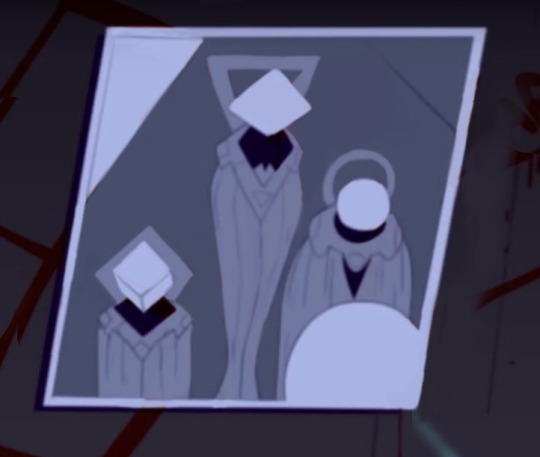
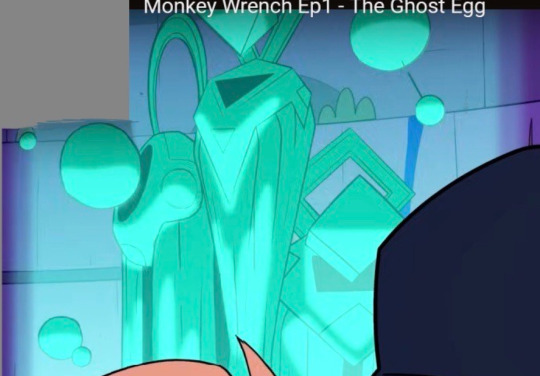
These are two instances where we have seen visual representations of the Primaries (cleanup and collages courtesy of my friend @awwkie-dot-jar. Here is their post and their thoughts on 'em!)
So from what we can see, the Primaries seem to be, quite literally, the shapes that represent them in the LAW symbol. A red triangle/pyramid, a blue circle/sphere and. A yellow square/cube
I'm gonna have to use Tezzoree as a gateway for what I want to say here
Commander Tezzoree is a character name-dropped at the end of episode 1. We get a faint glimpse of her in the Punti plush commercial.
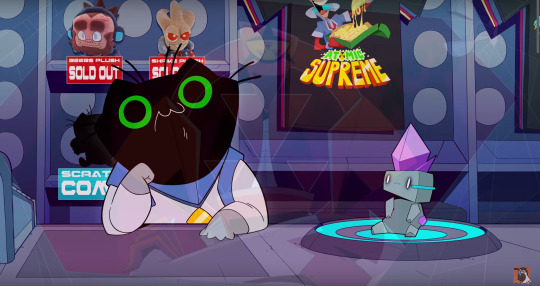
Here is a trace of the frame made by @spagheddiesquash (here is the post with it + his theories and ep 4 predictions!)
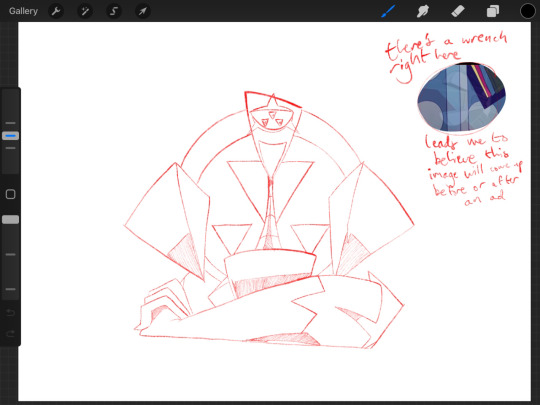
From what we can make out, Tezzoree also has a shape for a head like the Primaries (a red pyramid! although it's smaller than the ones on her "shoulders").
Tez' body looks more articulated than the Primaries', she has arms while the Trinity only seem to have formless gowns for bodies. Given how she has the title of commander, I suppose it's because she has more practical duties than them. As galactic rulers, they must keep a regal appearance.
I think they're their own kind of entities, and these shapes are all they are really, their bodies are built by other people for them to interact with the world around them. I say this because Primary Red and Tez aren't the only red pyramids we have seen so far
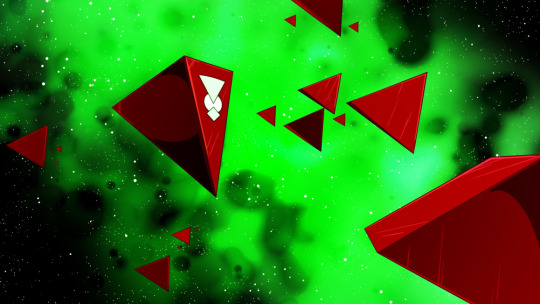
It's been made pretty clear that LAW doesn't want people going in the Quarantine Zone. These things could potentially not be ships, but sentient shapes roaming around the QZ, keeping watch of the corrupted species there.
So what we know about the Primaries' kind so far is that:
They're different shapes, each with a color attributed to them (triangle = red, circle = blue, square = yellow)
They can vary in size
They have to be built bodies for them to interact with the world. ...Or at least with other, non shape beings. Mortals? More on that later.
Now, we can finally get into our dear friend Shrike!

Shrike has a little cyan diamond in his head. With Beebs' attitude on Shrike having an internal translator and this line, it gives us the impression that it's connected to his brain.
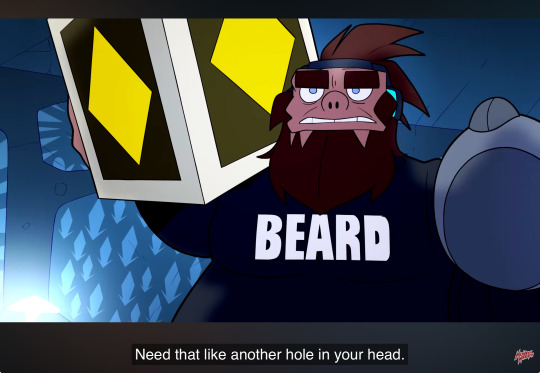
There's also more evidence pointing to that, like
Only Shrike can use it
He has to think of what object/thing he wants to take when pulling it out
He has to coordinate his hand, put it inside the light the diamond emits to get things in our out
But then there's something Shrike says about the diamond:
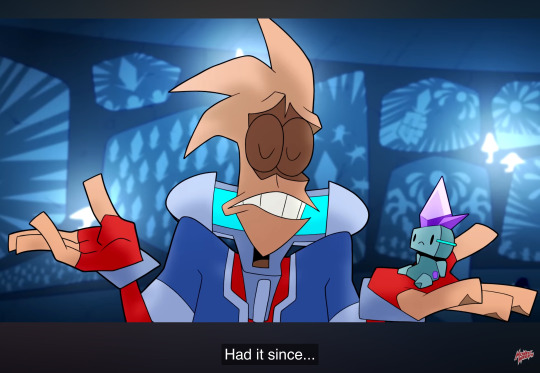
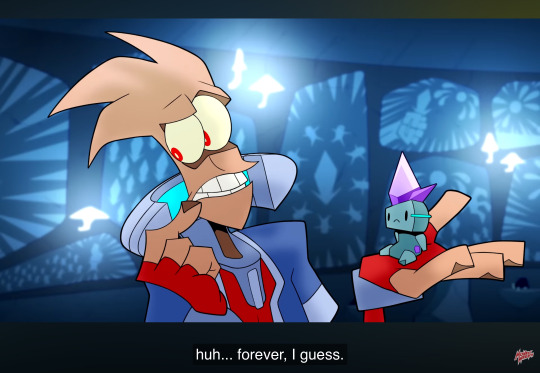
He's had it for as long as he can remember.
That leads me to believe that Shrike is the diamond. He's a Primary (or the same kind of entity as the Primaries) but instead of a robotic body, he was given an organic one.
And with that, I can talk about what that means for his character
2. His personality and him being a "separate"
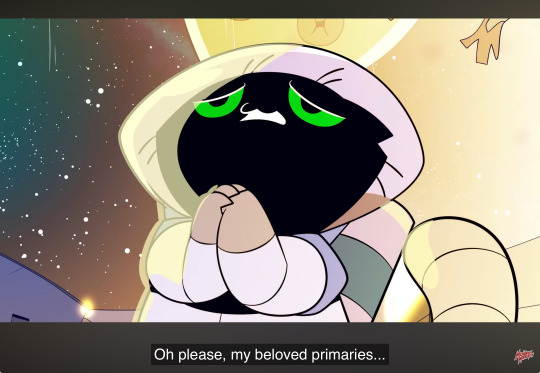

From how Scratch talks about the Primaries, it looks like they are seen as deities (the praying motion, "give me strength", the use of the word "Trinity" also has religious connotations)
I believe the Primaries are seen like that because they are immortal entities in a different, possibly higher plane of existence than the mortal characters in this world. Their way of thinking is much more abstract and it's incomprehensible to us.
If Shrike is one of them*, it could explain his disregard for other life like the Lythops, and his lack of sense of morality.
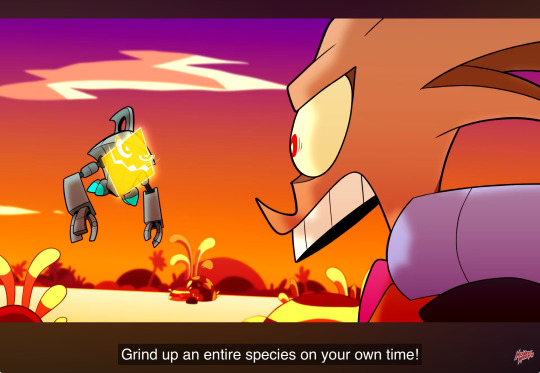
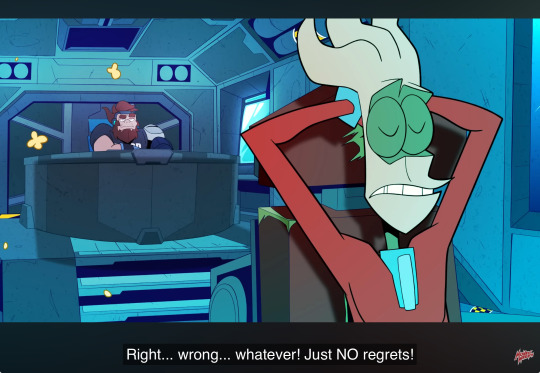
*Now, the cyan diamond is an entirely different shape and color to the Primaries', but that doesn't disprove that it's not one of them. It could mean that there are more shapes and colors to their kind than just the basic three we have seen so far. And maybe those have their own followers too...
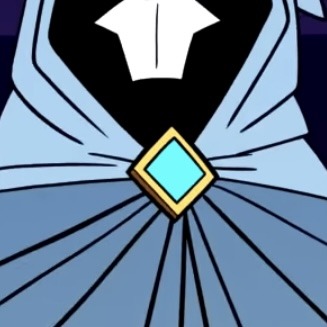
But if Shrike is this godly thing, how does he not know? Could he have possibly forgotten? Well I have an idea based on a character that's not quite like him, but might be going through something similar
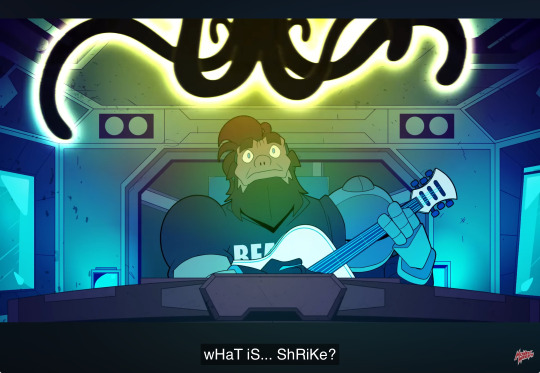
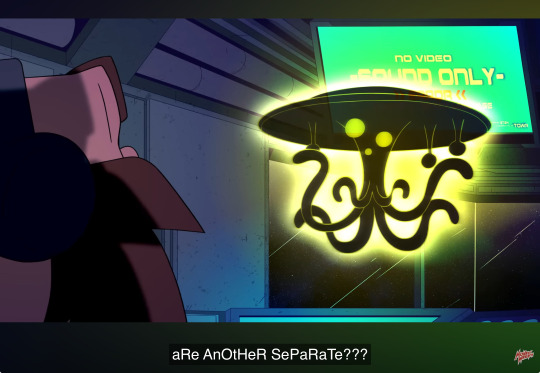
Us used to be part of a hive mind along with Them. That's why they call themselves "Us" and their friend, "Them". It takes them some time to assimilate that they're an individual being now, after being separated from Them. They only use the first person to refer to themselves until the end of the episode.
It's unclear if they were in a hive mind for the fact that they're a fungal species, or because of the cataclysm's corruption. But for either case, once they get separated, Us starts getting curious about every little thing Beebs says, but particularly about
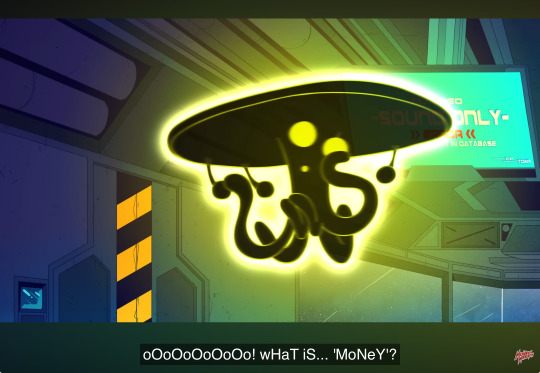
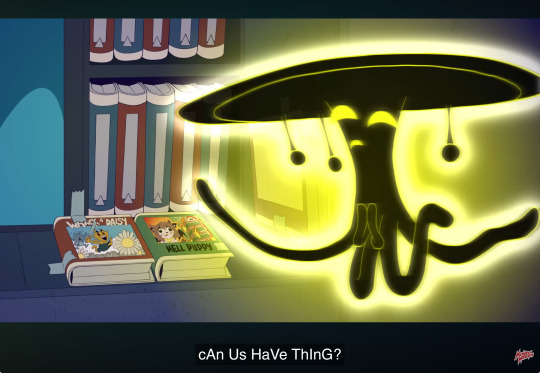
Money and material possessions! Sounds a bit familiar, doesn't it?
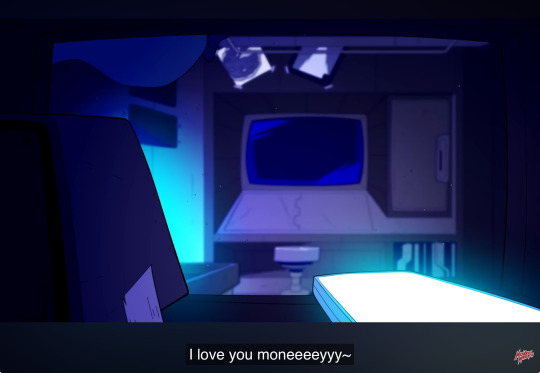
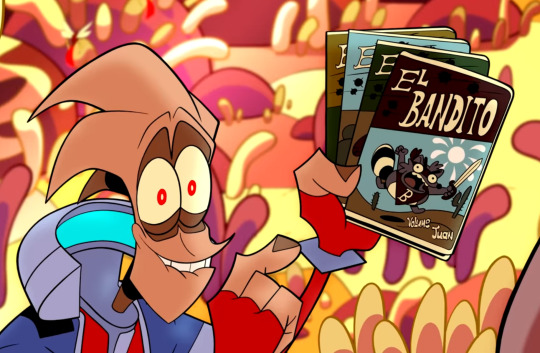

What I think is happening with Shrike is that he got put into this organic body and he's experiencing all these feelings that come with being fleshy and mortal, and he is loving it. He loves food, he loves money, he loves adrenaline, he's having fun with it! It's all new and exciting to him because it's not natural to him as a higher plane being.
The more he indulges in these feelings, the more he becomes an individual and he separates himself from others like his kind. The colors could each be hive minds of their own and Shrike got separated from his because of this. But where did he get this organic body in the first place?
3. His body/anatomy and Enforcement
Nobody knows what Shrike is. Not even he knows what he is. He's supposed to be from a squid based species, but his anatomy is a bit weird for a cephalopod.
For example, my friend and cephalopod enthusiast @samscartoonsofficial brought to my attention that squids and octopuses have blue blood. Shrike has yet to bleed on screen, but it's been hinted a couple of times that he has red blood. ...In fact he has a lot of red based attributes.
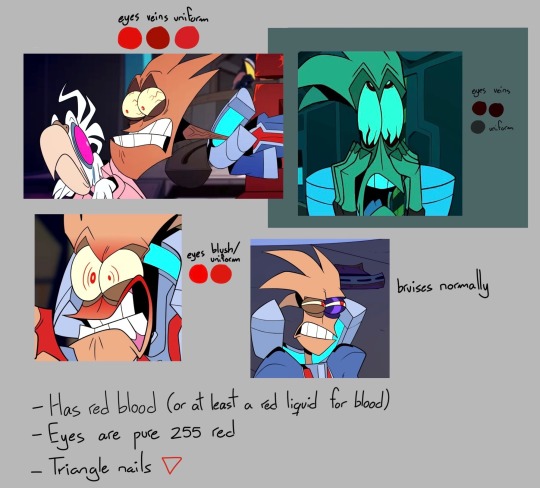
This is why I'm going for the science experiment theory. His body was created either by the red department of Enforcement or the yellow department of Science, but it was designed with all these red elements to be fit to be an enforcer. We've been introduced to bio science like the Fodder clones in episode 1, and it's not unlike LAW to do unethical things to their members, like the metal straps on their waists.
They might have taken away his cyan diamond memories in the process of inserting him into that body. Shrike might think he had a life before LAW, but we have yet to see that.

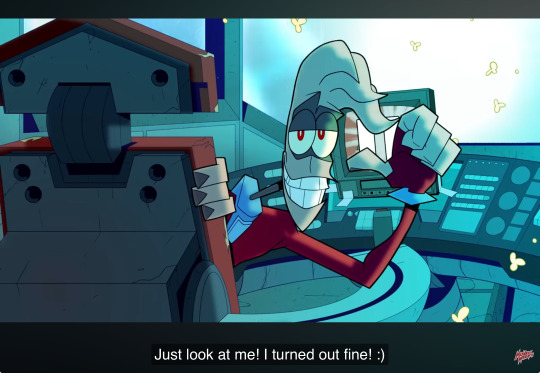
There is this small exchange that kind of challenges this theory however
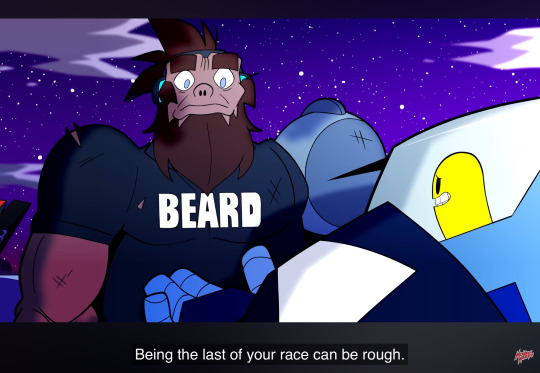
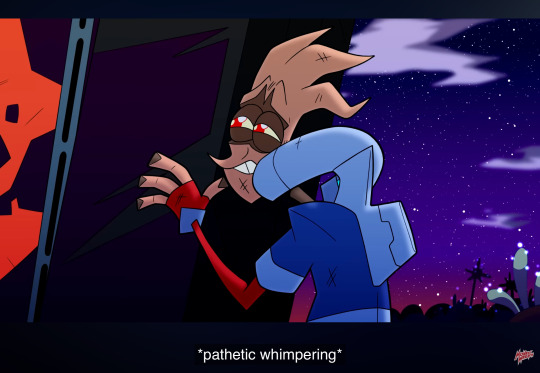
This implies that Shrike is the last of "his race". And if he was a science experiment, there shouldn't be anyone like him.
My guess is that his body could be designed as a paleontological reconstruction of a long extinct squid species? Think of the first Jurassic Park movies dinosaurs, before it started becoming common knowledge that they had feathers. It's the only way I can see the science experiment theory and this line both making sense.
We don't have enough material on this last point, but I can see the red blood thing going one of two ways
1. It's not blood, but ink
If his body was created by Enforcement, being mostly red based, it'd be no surprise if Primary Red took part in his creation. And maybe they made him be fuelled by ink, just like the ships and many of the objects in the show. Is it possible for species to have ink for blood though?
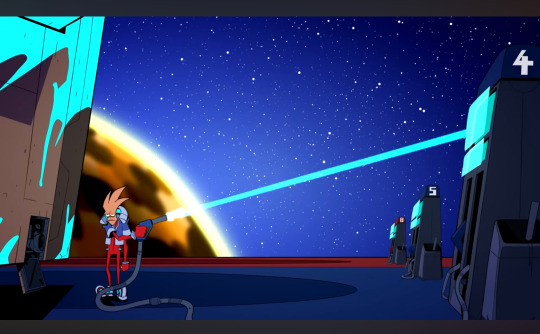
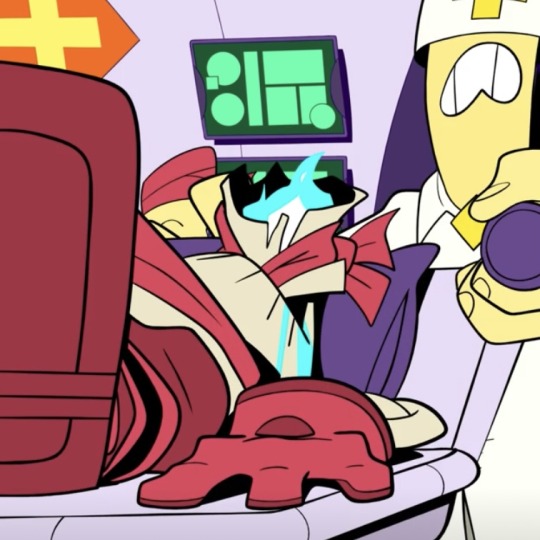
Maybe?? Skeletons seem to bleed their fire color, and because Ricket's is pure cyan it leads me to believe that he's bleeding ink here.
2. It's blood, but not cephalopod blood
Sam was the one to bring up this theory. Remember when I said that he could be designed to look like a long extinct species?
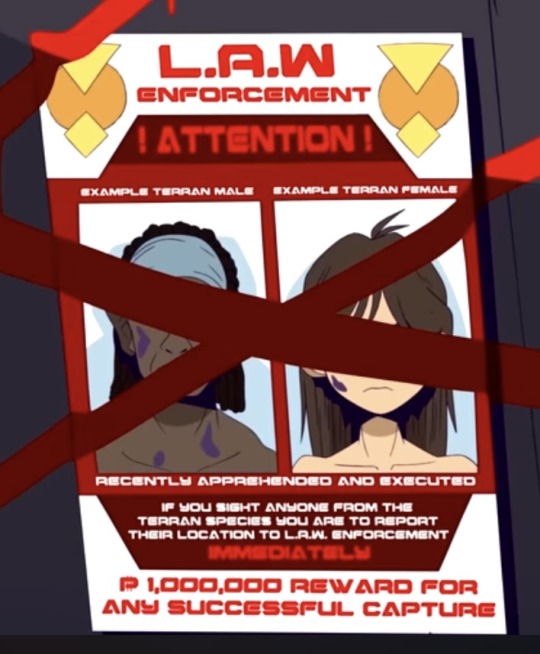
Yeah. He could have been designed to be a squid-terran hybrid, with Terran-like blood. After all he has an although distorted, similar anatomy to them. It would explain the Spanish and his appreciation for Terrans.
-
I'm derailing a bit there on that last part, but to summarize, I believe Shrike to be the same kind of entity as the Primaries, a cyan diamond, controlling a red organic body that was made for him to be in Enforcement. His body might be based on an actual squid species, or perhaps Terrans could be involved.
I could go on and talk about the meaning behind those two colors but I've already gone through a lot of things here and I've hit the image limit so I'd like to do that on a future post :o]
#monkey wrench#monkey wrench theory#thank you to the people who let me include their stuff on this post!!#tag#kie#spagheddiesquash#samscartoonsofficial#ask#payaso-gomi
42 notes
·
View notes
Text
INTERVIEW WITH SHIGENOBU MATSUYAMA - PRODUCER ON SILENT HILL THE ARCADE
I had the pleasure of interviewing Matsuyama-san, one of the producers on Silent Hill the Arcade! Here's what he had to say :)
Q - How did the idea for Silent Hill The Arcade come to be?
A - During the arcade boom of the 1990s and the 2000s, a desire was born to combine the unique worldview of the Silent Hill series - which was already a very strong IP console game-wise – with the haunted houses one might find in an amusement part. We wanted something that could provide an easy and pleasurable experience to an extremely varied range of customers… as in, the casual users. This is the idea that brought Silent Hill Arcade (SHA in short) to life. However, since our goal was to create a new kind of experience that could not be replicated anywhere else, we designed a game that could make the most effective use of the 5.1ch surround sound system, which was something that arcade games hadn’t adopted until that point, with a type of cabinet that could be somewhat isolated from the rest of the arcade via the use of curtains.
Q - Roughly how long did development for the game take?
A - At the time, the development cycle of an arcade game was so short it would be unimaginable today. The shortest one was around six months, the longest about one year and a half. I think SHA took us around one year and two months.
Q - What parts of development were most enjoyable for you?
A – Usually, arcade games are tested a certain number of times, both during development and just before launch in each and every country where their release has been scheduled (which, for SHA, meant Japan, the US, the UK, Italy, Spain, France, Hong Kong and Singapore). In order to keep the development budget for SHA as low as possible, however, I personally traveled alone to the US for the market testing, assembled the cabinet all by myself, repaired it when it was out of order, and stood next to it for days on end, pen and paper in my hand, ready to collect the players’ data. Game development, nearly 20 years ago, was very much an analog experience. It was also hard work, but when I look back, I have so many good memories of that time.
Q - Do you remember any kinds of ideas that you and the team wanted to include in the game, but didn’t in the end?
A – I’m sure this will sound obvious, since SHA was based on a pre-existing IP, but since the framework was pretty much already set when it came to characters and plot, we had to be extremely careful not to deviate from it so that we wouldn’t create inconsistencies. Personally, I would have loved to take the story in slightly wilder directions and include new and fresh ideas.
Q - I loved seeing so many locations from Silent Hill 3 and 4 make an appearance in the game! Was the team who worked on those two games involved in making any decisions for Silent Hill The Arcade?
A - We of course personally consulted select staff members of Konami, like for example Producer Yamaoka, with whom I had been acquainted with since before SHA. However, most development teams had a mix of internal and external members that changed pretty fluidly with each and every year, so there was no real collaboration between the various teams.
Q - What level of freedom were you given for creating this original story within the Silent Hill universe? Were you given any specific directives on what you could or could not integrate/use in the story?
A - If I have to express my personal point of view on the matter, however, should you compare the storyline for SHA with the timeline of the other games, you would indeed notice a few minor inconsistencies that we were not able to completely solve. That’s something I still have regrets about.
Q - Tell me about translating a traditional survival horror experience into the rail shooter genre and control style. What kind of considerations did you have to make for this?
A - The biggest challenge was by far to design a game system that could be as simple as possible, and to regulate the level of challenge in a way that felt balanced, because we didn't want to force complicated controls or an exceedingly high difficulty level on the casual arcade players. Moreover, there was another balance we had to strike perfectly: more specifically, the one between the aforementioned "haunted house" element - the one that was unique to SHA, with its sequences of terrifying events - and the thrilling playstyle that a rail shooter should provide to the player.
Q - As a final product, what are your personal thoughts on the game?
A - I think it had a state-of-the-art sound system, that the design of the cabinet, with its creepy-looking curtains, made people want to take a peek inside, and that the rail shooting system was simple and could be enjoyed by virtually everyone. I think we managed to combine these various elements with a one-of-a-kind worldview of Silent Hill in a way that was in my opinion pretty good! Of course, each and every member of the staff did their part, and I thank all of them wholeheartedly.
Q - Are you working on anything currently that you’d like me to mention?
A - Feel free to write whatever you prefer! If anything, I should thank you, since you allowed me to walk down the nostalgia lane and recall memories from almost 20 years ago that had been dimmed down by the passage of time. Thank you very much!
Shigenobu Matsuyama's site: shig.jp
52 notes
·
View notes
Text

☽ Welcome to the Temple of Vengeance! Greatest of the Great Gods, Khonshu, presiding. ☾
☽ Inbox: Open ☾
[Indie RP/Ask blog for Khonshu from the MCU's Moon Knight. Set after the show ends by default, but also open to other verses. Open for questions or threads! More info on the blog, or under the cut for mobile users.]
Updated: 11/03/24
Laws of the Temple
☽ BASICS ☾
- MUN STUFF: My name's Kew! She/they, well over 21. No triggers. I don't have DID, any attempt to portray it is based on the show/comics. I only speak English fluently and any other language will be google translate. Please forgive any mistakes!
- MINORS BE WARNED: I'm not going to be super strict about weeding out minors since I don't expect things to get NSFW around here, but the show Khonshu is from does explore some darker themes for a TV-14 show. I dunno. You've been warned.
- GENERAL RP ETIQUETTE APPLIES: Don't make actions for my character without asking, don't assume past relationships/deep history without asking, don't read my character's mind (unless your character is a telepath, and even then I don't know if that works on gods), etc. - GENERAL CONTENT WARNING FOR: Descriptions of violence, religious stuff, swearing, emotional manipulation, a.bleism (especially surrounding mental health stuff.) I’ll try to tag other things as they come up. - FEEL FREE TO REBLOG MEMES FROM ME. It actually helps me remember to send stuff out. You can also reblog art/headcanons, pretty much anything except RP threads if you're not the other party!
- NOT PRIVATE, BUT SELECTIVE: I sometimes don't follow big multimuses back since I have pretty strict tastes in fandoms, and I don't want to clog my dash with characters I don't know. That doesn't mean I don't want to roleplay with you though! As for selectivity, I reserve the right to say no if things just don't click writing-wise.
- SPOILERS FOR MOON KNIGHT EVERYWHERE. There will be untagged spoilers for both the comics and especially the show. I highly recommend watching the Moon Knight TV show if you haven’t seen it! It got me into comic books and made me interested in the MCU. - That said, I haven’t seen all of the content in the MCU, not even a third of it, so I’m sorry if I get any lore details wrong.
- KHONSHU IS AN ASSHOLE. Nothing he says reflects my real views about anything. If he’s mean to you, it doesn’t mean I don’t like you or you’ve done something wrong.
- FOR OTHER MARC/STEVEN/JAKE MUSES: By default, I'll play Khonshu like he's connected to your Marc/Steven/Jake. If you want it to be dimension-hopping shenanigans (which I'm super down to do, especially for ones more heavily based on the comics) you'll have to let me know! All these interactions will be on different verses, and I don't plan to have Khonshu be 'mains' with any muses.
- FIGHTS: With extremely rare exceptions, I'm just gonna say no to fight threads with Khonshu. Partly because he's incorporeal and really can't be hurt or hurt anyone else directly. Mostly because fighting other muses has always stressed me out. If it's something you really want to do, we can talk about it. (This doesn't mean your character can't attack Khonshu ever, it just means it probably won't work.)
☽ MUSE INFO ☾

NAME: Khonshu OTHER NAMES: Chons, Bloody pigeon, Silly old bird (He accepts none of those) PRONOUNS: He/him HEIGHT: Varies, usually around 8-10 feet tall. WEIGHT: N/A (Incorporeal, like a ghost) AGE: Has existed since the dawn of time, so who knows.
- KHONSHU is the Egyptian god of the moon, vengeance, healing and time, among other smaller things. While he is enormously powerful in theory, he’s mostly unable to affect the physical world without use of a mortal AVATAR, dubbed his MOON KNIGHT. Those who agree to be his Avatar are granted superpowers and near-invulnerability, in exchange for agreeing to carry out his mission: Bringing vengeance against those who harm his travelers of the night.
- Khonshu is also somehow a billions-year-old grumpy baby who flips over trash cans when he doesn’t get his way.
- By default, Khonshu's current Avatar is JAKE LOCKLEY, and only Jake Lockley. But, he can also be played before the events of the show, when he (technically) has the triple threat of Jake Lockley, MARC SPECTOR, and STEVEN GRANT.
- Jake will make occasional cameos on this blog, but I wouldn't call this a dual muse. (You can request him in asks if you want.)
- Normally, only his Avatar (or Avatars of other gods) are capable of seeing/hearing Khonshu, but let’s say this blog is a holy space where he can answer your prayers questions. (In threads, we can always BS a reason your character can see Khonshu.)
- This Khonshu is HEAVILY BASED ON THE TV SHOW, which means he lacks a lot of the harsher history his comic book counterpart has. That said, as a god, he is aware of the multiverse and has at least a rough idea of what his counterparts are up to. You can ask about comic stuff, he just might have a different opinion.
- Some comic lore has been added/built upon, namely his fraught history with his father, AMON-RA. (This probably won’t come up much, but it does inform a lot of how I play the character.)
#moon knight rp#mcu rp#moon knight#In Character#OOC#Verse: Pre-Series#Answered Asks#About: Jake Lockley#About: Marc Spector#About: Steven Grant#About: Layla El-Faouly#About: Ennead#About: Self#About: Arthur Harrow#I'm realizing that my taglist will cause this post to appear in all the character tags so I'm sorry about that
13 notes
·
View notes
Text
My brain is going whirr whirr whirr so here’s a random lesson/unhinged rant on romanization. What is romanization? It means using the letters of the Latin alphabet (in this case I really mean the English alphabet) to represent a different script. Obviously I’ll be talking here about how we represent the Thai script (which I know is technically an abugida not an alphabet, don’t @ me). The way I see it, there’s two basic reasons to do this.
To make the word more pronounceable/memorable/understandable for people who speak languages that use the Latin alphabet. For example you’re a learner who doesn’t know the Thai alphabet 100% yet and you want to make notes on a word you just learned. Or you’re putting up signs for tourists, where it doesn’t really matter if they can pronounce the name of the place properly as long as it matches what’s in their guidebook.
Technical limitations. For example, someone from a country with a different writing system has to fill out their name in a form that only accepts latin letters. Or maybe you want to message a friend in Thai over in-game chat but it doesn’t support Thai. Or maybe you could theoretically be typing in Thai but you have a US keyboard so it’s just easier to turn to romanization instead.
One thing relevant to me, and probably anyone reading this is the romanization of character names. I see it as a combo of 1 and 2. Obviously the audience needs a memorable way to think of the character and also it would be bizarre to randomly switch into Thai in the middle of the English subs, if the software even lets you do that.
There are two basic categories of romanization. Transcription is where you use the Roman alphabet to represent the sounds of thai, and transliteration where you basically just substitute English letters for Thai ones. The big difference between the two is going to be with ending consonants, since there are different pronunciation rules for initial consonants than for when that letter is the final consonant of a syllable.
THERE IS NO STANDARD SYSTEM FOR ROMANIZING THAI
Okay, well there is the Royal Thai General System of Transcription (RTGS), and it is official, but even the government doesn’t use it consistently and also I hate it, which is what really matters. It’s terrible for English-speaking learners because a lot of choices are misleading. Think of all the people who cannot pronounce ‘Phuket’ because in English ‘ph’ is ‘f’ but in RTGS it’s an aspirated ‘p’ (so to me just a normal ‘p’). This would be okay though if you gained a basic familiarity with how RTGS worked, or just looked up a chart or something. Much worse is the fact that the combination of letters ‘ch’ are used to represent two completely different sounds in Thai. Part of me wishes translators would always use RTGS so we could have consistent subs, but then I remember it’s terrible and most Thais do not use it for their names in reality. The good thing about RTGS is that since it doesn’t use any diacritic markers or other non-Latin characters it’s useful when technical limitations are the issue.
Most materials for learners will use some form of transcription, but this will vary wildly. I had my own personal system at one point, but didn’t end up using it much because I stopped taking notes and switched to listening only. However, now I'm all about the Thai alphabet.
There are downsides to transcription. One is that many sounds in Thai simply do not exist in English, so any attempt to transcribe fundamentally won't allow an English speaker to intuitively pronounce it correctly. Another is that the pronunciation of the same word can vary, which you’ll see a lot with any word containing ‘ร’. Formally (or sarcastically), this will be a rolled ‘r,’ but normally people pronounce it ‘l’ (if it’s pronounced at all, in consonant clusters people just drop it and they also tend to drop actual ‘l’ sounds in clusters). So of course it makes sense to be written ‘r,’ but it’s not going to sound like that most of the time, so is that really transcription at all? Also our own letters don’t actually correspond to specific sounds in English, so English is a fundamentally terrible language to try to transliterate things into?
The advantage of transcription, where you just swap a Thai letter for an English one, is that it’s very easy for someone who is Thai. They can just spell the word in Thai in their head and make the substitution, no worries about how it actually sounds. I don’t mind transcription at this point, since I am starting to get the hang of final consonants, and in some cases it helps me guess at the Thai spelling of the word. Buttttt it’s not actually that helpful for that since there are lots of cases where multiple Thai letters make the same sound.
Whatever you’re doing, you have to wrestle with the fact that Thai has tones, so if you’re not representing the tones somehow, you definitely won’t be able to pronounce a word properly based on its romanization. And if you’re using romanization for reason 2, technicla limitations, it may be literally impossible to represent tones. RTGS doesn’t bother with tones. Or vowel length. So that’s great.
If you want to actually learn to pronounce a word in Thai and don’t know the Thai script, your best bet is IPA. The International Phonetic Alphabet is a standard way to represent sounds, so it’s super useful…if you know IPA. Or if you want to look through some charts and listen to some audio files to learn how to pronounce one specific thing. It’s not useful for resolving technical limitations because it uses lots of symbols not in the Latin alphabet. And unless you want to be a polyglot, why waste time learning IPA when you could just learn the Thai script? Also it doesn’t do tones.
Here’s a website where you can plug in any thai text and get a transcription, including in IPA. There are many options. If you do it with a character’s name, you can try those options and it’s totally possible none of those will match what you see in the subs because the actual human is using transliteration/their own random system that is not one of the things listed/there's a canon romanization of the character's name. But also because sometimes it's just wrong. Have fun.
For more resources on pronouncing Thai I recommend Stuart Jay Raj. His way of talking about things takes some getting used to, but his ‘indic compass’ is actually pretty useful. If you set it to show Thai, you can click on a letter to hear it and see how it’s supposed to be made in the mouth. I also like his video on vowels.
For more on Thai names, see @recentadultburnout’s posts on Thai name meanings.
Because I’m currently obsessed with Century of Love, the rest of this is using the two actors, Daou and Offroad, as examples:
Did you know that Daou’s name had two syllables? My mind was blown when I heard it.
Thai: ต้าห์อู๋ IPA: tâː ʔǔː RTGS: tau The way I would write it for myself: dta-oo
Absolutely no way I was getting that from reading 'Daou.' That first letter is an unaspirated, unvocalized alveolar consonant, and I know what that means because despite not being great at IPA, I am pretty obsessed with how in the mouth sounds are made. Basically it’s like ‘d’ or ‘t’ without actually being either of them. ต้า is the first syllable and ห์อู๋ is the second, but this is not a reading lesson, let's move on.
Offroad’s name is literally the English word ‘off-road’ like a jeep. In Thai script it’s ออฟโรด (not just his name, also when discussing motor vehicles). The site gets this one 'wrong,' putting an 'f' when that's not what 'ฟ' does as a final consonant, but closer to actual English word, so I used charts for this.
Thai: ออฟโรด IPA: ʔɔ̀ːp rôːt RTGS: oprot
There’s no ‘f’ ending sound in Thai, and consonants are always unvoiced and unreleased. If you read my Wat/Wad post, I said 'ด' as a final consonant makes a ‘t’ sound, but I really meant it’s the weird ‘dt’ sound. So lots of people pronounce his name something more like ‘awploadt.’ I kept thinking people were calling him ‘upload’ until I actually thought it through.
Feel free to send your burning questions about pronunciation/spelling, though I’m definitely not advanced enough to be confident recording myself saying anything.
#thai language#thai linguistics#thai phonology#romanization#subtitles#daouoffroad#daou pittaya#offroad kantapon#translation is hard#squeakygeeky learns thai
14 notes
·
View notes